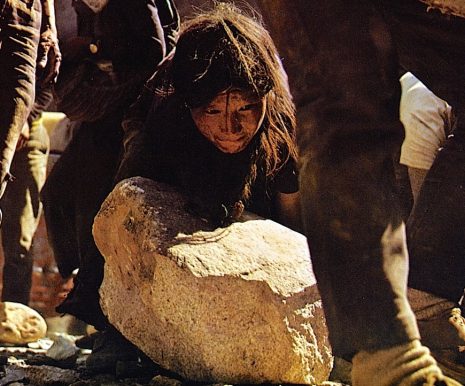
REFLECTIONS ON GYALO THONDUP & MODERN TIBETAN HISTORY
Power Struggle in Exile – The Opening Guns
The above image by pioneering color photographer, Ernst Hass, compellingly captures the early Tibetan refugee experience: dislocation, disease, trauma, desperate poverty and so much more. It also underlines the native toughness of these women and men, and their readiness to work hard and struggle for survival. What the photograph does not reveal is a vision these refugees shared. The vision of a free and democratic Tibet the Dalai Lama had promised, in fact prophesied, which gave everyone – schoolchildren, teachers, road-workers, officials, monks and the resistance fighter jumping out of a C-130 plane over occupied Tibet – the hope, unity and courage to hang in there and make the sacrifices called for.
This is not a detailed dissertation on how we got from that idealistic moment in our exile history to the mind-numbing cynicism, apathy and sell-out culture of today. It is rather a shorter (and admittedly perfunctory) study of the initial power struggle in exile, conducted principally by Gyalo Thondup, which deeply influenced the course of subsequent events.
When the Dalai Lama established the Tibetan Government in Exile (TGIE) at Mussoorie, following his arrival there on 21st April 1959, he had with him a core group of ministers from his kashag in Lhasa (besides other officials) that Gyalo Thondup himself acknowledges in The Noodlemaker of Kalimpong (NMK) were “most capable and trusted” (NMK 211). The ministers were Surkhang Wangchen Gelek (senior kalon), Niushar Thupten Tharpa (deputy kalon or katsab), and Shengka Gyurme Sonam Topgyal (deputy kalon or katsab). Ngabo Ngawang Jigme, had, as we all know, stayed behind with the Chinese. The junior minister Sampho Tsewang Rigzin was unable to leave Lhasa. On the morning of March 10th he had been hit on the head by a stone outside the Norbulingka. He was taken to the nearby Indian Mission infirmary, but then moved to the Chinese hospital and guarded by PLA soldiers.
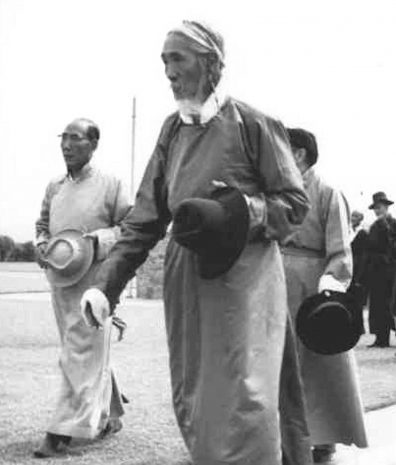
Other Tibetan officials who had earlier escaped to India immediately responded to the Dalai Lama’s arrival in India. According to Shakabpa, all former Tibetan officials residing in Kalimpong and Darjeeling, “…including Prime Minister Lukhangwa and Deputy Kalon Yuthok went to Mussoorie”[i] Lukhangwa was requested to continue as prime-minister but he had severe health problems and offered his resignation. He accepted the role of a senior advisor to the Dalai Lama and the cabinet. Yuthok Tashi Thondup who in 1956 resigned in protest against Chinese pressure on the kashag and stayed behind in India, was now reinstated in the new cabinet.
The Dalai Lama writes that when setting up the exile government at Mussoorie he made “radical changes” and instituted separate departments with cabinet ministers to head them.[ii] Surkhang got Home, with Phala as assistant minister (kalon chagrok). Shengka was given Religion, Yuthok, Finance while Foreign Affairs[iii] went to Niushar (who was earlier the Foreign Secretary in Lhasa) with Gyalo Thondup as his co-kalon (kalon chag-drel) but with full kalon rank. A detailed description of the four major departments (with their ministers and deputies) and other secondary departments is provided in P.T. Takla’s autobiography and also in Yuthok’s biography [iv] but they mistakenly include Kundeling Woser Gyaltsen as Education Minister. Kundeling was only appointed in the second kashag on 4th October 1960, as his own autobiography confirms.[v]

In his autobiography GT describes himself then as “… the newly appointed foreign minister of the Tibetan government in exile” (NMK 195) with no mention of his senior colleague. In that role GT tell us he “…was responsible for responding to the questions” from journalists at the press conference at Birla House, Mussoorie, on June 20,1959. GT fails to mention that this was actually the Dalai Lama’s first press conference and that His Holiness’ statement was read in English by Jigme Yuthok (son of Kalon Yuthok) who also translated His Holiness’s answers to the journalists with the help of another English speaking official, Rinchen Sadutsang. Jigme Yuthok mentions that GT then “…was not fluent in English.”[vi] as he had been educated in China. A fact confirmed by another English speaking official at the time.
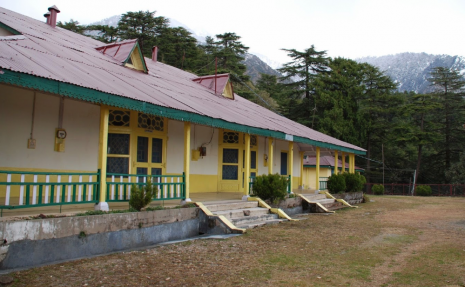
In April 29, 1960, the exile government moved to Dharamshala. His Holiness and his immediate circle occupied Swarg Ashram (earlier Highcroft House, these days the Mountaineering Center). The kashag took over Mortimer Hall (now the Liaison Office of the Indian Foreign Ministry, just by the Bhagsu Hotel, and incidentally once the residence of Lord Elgin (who in 1860 burned the Imperial Summer Palace in Peking to the ground). The hundred odd Tibetan officials bunked in the adjacent servant quarters and stable stalls. It was rough living for them. His Holiness remembered that “… many of them, even the quite elderly men, were compelled to live under very poor conditions – some taking shelter in cowsheds, for example. But this they did cheerfully without complaint, even though they had lived extremely well throughout their lives in Tibet.”[vii] In Darjeeling we heard that kungo so-and-so was making his morning ritual water-offering (yon-chap) in seven bottle-caps – which brought tears to my mother’s eyes.
In 2008, for the first time ever, a photographic line-up of the early exile kashag was published in a glossy CTA souvenir journal[viii]. Strangely enough the name and image of Kalon Yuthok was missing. Stranger still, the photograph of Gyalo Thondup was also excluded from this line-up, and also from all the photographs of subsequent kashags, till that of August 1991, when he joined the kashag for the second time.[ix] There was some desultory speculation about censorship but perhaps carelessness was to blame.[x]
Very soon Gyalo Thondup asserted himself not only as the principal foreign minister (chise kalon) but also as the undeclared “minister of war”. By now he was the éminence grise of the Chuzhi-Gangdruk resistance organization, and his relationship with Indian intelligence and the CIA was not only exclusive, but jealously guarded from the rest of the exile government. GT operated largely out of Darjeeling and New Delhi, but would occasionally travel to Dharamshala to meet with the kashag.
THE DALAI LAMA’S TREASURE
The first crisis the exile kashag had to deal with concerned the reserve of gold and silver taken by the Dalai Lama when he and his cabinet fled Lhasa in October 1950 to Dromo, on the Sikkim border. “Fifty or sixty strong-boxes of treasure, mostly gold biscuits and bars of silver from the vaults at the Potala…” [xi] had been hauled by mule train to Dromo and, on the Dalai Lama’s return to Lhasa, had been sent to Gangtok for safekeeping. The Dalai Lama mentions that this had been the idea of Khyenrap Tenzin, the Chikyab Khenpo, who had kept it a secret from everyone. His Holiness though subsequently grateful for this initiative by his senior monk official, was initially “…furious when I found out.”[xii] as the Chikyab Khenpo had not even told His Holiness about his plan.
GT’s account of this treasure differs. He writes that the bulk of the treasure stored in Gangtok were “gold bullions” purchased by Shakabpa in the US in 1950 (NMK 214) and that the Dalai Lama’s gold and silver from Lhasa were an “additional” amount.
GT also announced in a kashag meeting that he would personally take charge of this treasure. This created one of the first disputes in the new cabinet. The finance minister, Yuthok and his deputy Rimshi Yarphel Pangdatsang, considered the treasure to be within their department’s purview and argued that it should not be immediately used but maintained as a reserve. Yuthok’s biography mentions that GT became angry and walked out of the meeting.[xiii]
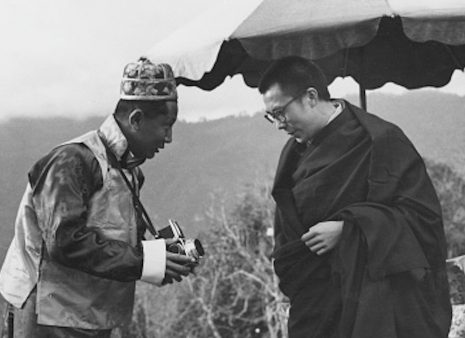
The gold and silver had been entrusted to the Chogyal of Sikkim for safekeeping after His Holiness’s return to Lhasa. The Sikkim Royal Family had, for ten years running, faithfully looked after the Dalai Lama’s treasure, which was locked and sealed securely in a cave on the side of the hill just below the Royal Palace. It was guarded at all hours by armed soldiers. Gyalo Thondup took charge of the gold and in December 1959 had it transferred to Calcutta for sale and investment. Kungo Jampa Tsondue, a senior leader of GT’s Tibet Welfare Society, who was involved in the transportation of the gold and silver, gave me a detailed account of the undertaking.[xiv]
The story somehow leaked to the press. AP correspondent Henry S. Bradsher (a friend of GT’s) filed a report which appeared in the Times of India.[xv] Ten days later the Calcutta Statesmen came out with a dramatic and colorful story by correspondent Desmond Doig, about the “God King’s Fabulous Fortune”.[xvi] All this caused some embarrassment to the Sikkim Royal Family which had already taken offence at what they perceived to be the high-handed and discourteous manner in which Gyalo Thondup had the gold taken from Gangtok.
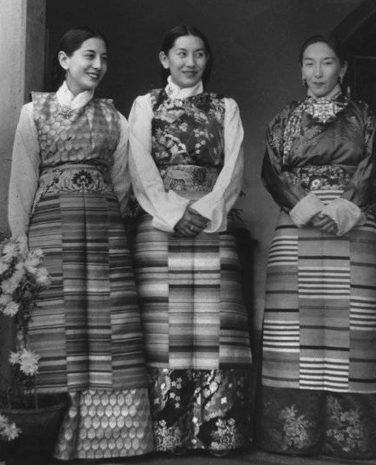
The Chogyal’s younger sister Princess Coocoo la, who had till then been a close and trusted political ally of GT, and who, according to CIA officer, Ken Knaus had in the mid 50’s “… joined Gyalo Thondup’s group”[xvii], now broke with him openly. Accusations were exchanged. Gyalo Thondup’s Tibetan language newspaper, Freedom, printed a scurrilous report, which, perhaps attempting to kill two birds with one stone, claimed that Princess Coocoo la was sleeping with the correspondent Desmond Doig (who was in fact gay). Indian law then required all periodicals published in the country to have an Indian national as an editor. At GT’s request my father, Lhawang Pulger, had, in 1960, taken up the nominal editorship of the paper.[xviii] My father was horrified when the Princess Coocoo la story came out. He quickly resigned.
The Dalai Lama in his autobiography says “ At first, I had it in mind to sell the treasure directly to the Indian Government, a plan proposed by Nehru himself. But my advisors were adamant (my emphasis. JN) that the treasure should be sold on the open market. They were certain we could get more money for it that way”[xix].
I find it difficult to imagine any of the Dalai Lama’s advisors being “adamant” with him, except perhaps for Gyalo Thondup. GT himself asserts confidently “We decided to sell the bullion. Prime Minister Nehru offered to buy it all, but we thought we could get a better price on the open market.” (NMK 214). In “The Noodlemaker…” GT often tends to use the collective plural “we” when describing undertakings that subsequently went wrong. Whenever recounting a success the first-person singular is favored.
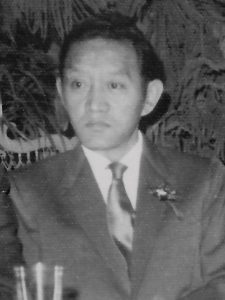
Gyalo Thondup chose Dundul Namgyal (DN) Tsarong as his assistant in the sale and investment of the gold and silver in Calcutta. Tsarong had been a fourth rank official in Lhasa and (unlike his famous father) had no personal experience of big business or high finance. GT claims he chose him as D.N. Tsarong was educated at St. Josephs School and spoke “excellent English”. GT and D.N. Tsarong’s combined inexperience of Indian business practices (dealing with some of the sharpest Marwari businessmen) and near total ignorance of modern industry caused severe losses in their holdings. G.T. attempts to claim that after D.N. Tsarong’s appointment he, GT, had nothing more to do with the fund. A recently published autobiography of the official, Rinchen Sadutsang[xx] provides a detailed and factual account of the financial fiasco. Sadutsang, who took over the business after its failure, makes it clear that GT was the senior-most official in the company. “On January 16, 1971, Gyalo Thondup, chairman of the company and elder brother of HH the Dalai Lama, resigned. A year later in June 1972 D.N. Tsarong, the company’s managing director, took medical leave and then resigned.”
Besides Nehru, other eminent Indian leaders had offered advice on this matter. Friends of Tibet such as Jayaprakash Narayan and Acharya Kripalani had cautioned Gyalo Thondup and other Tibetan officials from going into business with Indian entrepreneurs, and advised them to buy property in New Delhi instead – which in the early sixties was plentiful and affordable. GT himself admits in the end, somewhat wistfully, that “…if we had, for instance, invested it in the property market in New Delhi instead, imagine the fortune we would have now.” (DMK 218).
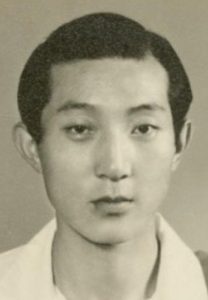
GT provides no figures but His Holiness writes that around eight million US Dollars ($65 million in present day terms) were lost and that only an eighth of the money was recovered. On January 20, 1964, the Charitable Trust of the Dalai Lama was registered in Calcutta, where according to an exile government report all that was salvaged “… in cash, loans deposits and shares in Gayday Iron and Steel Co. and the G.S. Mandidip Paper Mills, totaled Rs. 79,00,000. Only 11% of which was in cash.”[xxi] In a “closing of the stable doors…” gesture, Jayaprakash Narayan was requested and he “… consented to be the chair of the Trust.”[xxii] It should be mentioned here that under Rinchen Sadutsang’s able directorship of the Trust a partial recovery of the lost funds was eventually achieved.
In his book Gyalo Thondup blames Tsarong for the entire loss, even suggesting that Tsarong stole the money. But many in the Tibetan community blamed GT, as he himself admits. “Some even still suspect that I stole the money.” (DMK 218).
Dundul Namgyal’s son Paljor has written a detailed refutation, backing it up with extensive court documents, financial statements, and relevant correspondence, which Tsarong seems to have maintained meticulously, and which does an effective job of exonerating him of GT’s fairly crude and scattershot charges.[xxiii] Gyalo Thondup makes no mention of it but his family and the Tsarongs were very close. GT’s younger brother, Lobsang Samten, married D.N. Tsarong’s daughter. GT’s own daughter married Tsarong’s oldest son. GT himself has a niece, a nephew and grandchildren out of this familial alliance, yet it does not seem to have dissuaded him from casually dropping a bomb on it all when it suited his purpose.
To reinforce his accusations against Tsarong, GT makes a near-lunatic charge that Tsarong’s father, the famous Dasang Dadul Tsarong, was “the biggest thief” in Tibet and kept a printing press in his home in Lhasa to print his own currency notes. Old Tsarong was a commoner, a man of the people who had earned his eminent position in Tibetan history by saving the life of the 13th Dalai Lama in 1910. He was a man of honor and though comfortably retired in Kalimpong at age 72, he returned to a troubled and fearful Lhasa city at the beginning of 1959 to try and “save” the young 14th Dalai Lama. That he met the Dalai Lama and tried to persuade him to leave is confirmed in a recorded interview with the Dalai Lama.[xxiv] When the Dalai Lama declined to leave, Tsarong stayed behind in Lhasa and on March 11th became one of the leaders of the Tibetan Peoples Representatives Conference (bhod mimang thunmi lhentsok) which made a formal declaration of Tibet’s independence and demanded the return of the PLA to China.
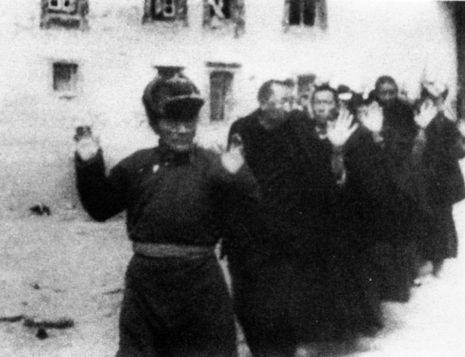
Being the former commander in chief of the old Tibetan army Tsarong organized and directed the various Tibetan forces from his Headquarters at Zhol when the fighting started. Tsarong was arrested by the Chinese for leading the armed “rebellion” against the Chinese. He died in Silingpu prison in May of 1959.
The sad reality of the loss of the Dalai Lama’s treasure was that every, I repeat, every exile foray into modern industry: Iron and Steel Manufacturing, Paper Manufacturing, and later Plastics & Fiberglass, Auto Repairs, Woolen Blanket Manufacturing, all went belly up, not so much from embezzlement or corruption (which could have been the case but for which there is no hard evidence) but largely from lack of real knowledge and experience of modern finance and industry. Only when, much later, Tibetan businessmen and even the TGIE fell back on traditional industry they had experience in, like carpet weaving and marketing, they not only succeeded, but in the case of the Tibetan carpet industry in Nepal, succeeded spectacularly.
THE KUDRAK/KHAMPA PURGE
Back in Dharamshala, the finance minister Yuthok and his deputy Yarphel Pangdatsang began to feel GT’s displeasure for disagreeing with him on the matter of the Dalai Lama’s treasure. It did not matter that in the mid-fifties Yuthok had joined Gyalo Thondup’s organization in Kalimpong and supported GT, as CIA officer Ken Knaus has noted[xxv] or that Pangdatshang had been a close friend of the Yapshi. The Royal Mother always stayed at Pangdatsang House whenever she visited Kalimpong. These two officials had committed the cardinal sin of disagreeing with Gyalo Thondup.
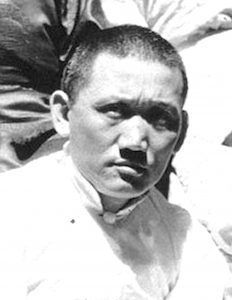
In the early 1960’s Yarphel Pangdatsang was issued a “Quit India” notice from the Indian police. He left for the UK, then Hongkong and eventually the PRC. There were rumors of him being kidnapped from Hongkong by Chinese agents, but whatever the truth, it was a propaganda coup for Beijing and a black eye for the exile government. An American academic has claimed that the Indian Government took this action on “Gyalo Thondup’s advice.”[xxvi]
Then in Kalimpong a small seminal political party calling itself “Mimang” (The People) called on the exile government to use some of the Dalai Lama’s treasure to provide immediate aid to Tibetan refugees, especially those suffering in the road camps. This political party was established following the Dalai Lama’s public announcement on 10th October, 1961, of a democratic political system for Tibet. In his announcement the Dalai Lama also provided “the outline of the principles” for the democratic constitution of Tibet he was preparing.”[xxvii] The Dalai Lama’s announcement may have encouraged the formation of at least two other embryonic political parties, whose closure because of subversion by GT’s followers will be discussed in another post.
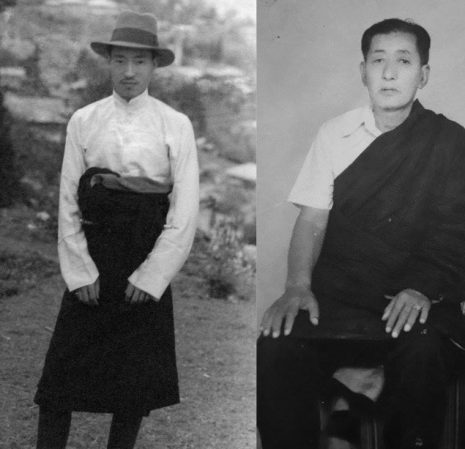
One of the founders of the earlier mentioned “Mimang” Party was the Kalimpong based entrepreneur, Markham Thoesam, who had started a successful automobile workshop in Kalimpong, and in pre-‘59 Tibet at Sharseema, where he assembled and repaired the many motorcycles, Jeeps and Land Rovers imported into Tibet. Other members of the party were Lithang Tseta Lobsang Tashi, Trehor Gara Lama, Tsakhalo Lhazoe Gyaltsen, Tungsung Jhola and most notable of all Manang Abo Pema Tsewang, one of the publically chosen leaders of the March Uprising[xxix], who had escaped from Lhasa to Kalimpong in the aftermath of the fighting.
What made this call from the small “Mimang” political party unacceptable to GT was perhaps the fact that Manang Abo had been a family friend of Surkhang and also related to Pangdatsang. In 1962, Manang Abo, his colleague, Markham Thoesam and the others were denounced as Chinese spies to the India police. As this took place after the Chinese invasion, the Government of India had recourse to more severe legal measures (The Defence of India Act of 1962) than its earlier Quit India Notice. Manang Abo was kept under strict house arrest in Calcutta. A number others were interned (including many Chinese residents of India) at the Deoli Internment Camp in the Rajasthan desert, where the British had earlier locked up Nehru and other Congress activists.
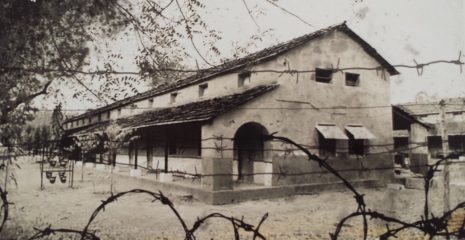
The Deoli Tibetans were released in 1967. They had suffered tremendously in the sweltering heat and unhealthy conditions at Rajasthan. Yarphel Pangdatsang’s private secretary, Drunyik Pema Gyalpo, was also arrested and interned in Rajasthan. He was released in 1967 but became mentally unbalanced and died an indigent at Dharamshala. Manang Abo who had suffered much hardship under house arrest in Calcutta, died in 1965. Markham Thoesam died in 1981.
A mysterious gunman took a potshot (but missed) at Yarphel Pangdatsang’s brother Rabga in the main street at Kalimpong.
Tibetan exile society became a fear-ridden place, especially for those who had opposed or spoken against Gyalo Thondup. There was a lot of whispering about Yabshi “soba”, meaning a spy or an informer.
The general belief in Tibetan society at the time was that Gyalo Thondup’s near monopoly connection to Indian intelligence, and his control of the Chuzhi-Gangdruk, gave him the power and influence to make bad things happen to those who crossed him. We should mention the great esteem that Indian intelligence and senior military personnel had for “Mister Thondup” then. GT was urbane, wore expensive suits and spoke English – with confidence and a cavalier disregard for grammar. He also had tremendous charisma, but above all he was the Dalai Lama’s older brother. G.T is said to have presented Rolex watches to Indian intelligence and military high-ups. In India’s semi-socialist economy at the time such “foreign luxury items” were nearly impossible to obtain. Lhamo Tsering mentions Rolex watches in the first CIA air-drops.[xxx]
It should be noted that to date there is no direct evidence of GT’s complicity in any of the unfortunate events I have mentioned. India passed its version of the Freedom of Information Act in 2005. It is perhaps time for some researcher to look into police and CID records from that period, and provide some closure to this unsettling period of our modern history.
“STRUGGLE, CRITICISE, TRANSFORM” [xxxi]
Gyalo Thondup regarded Surkhang Wangchen Gelek as his principal adversary in the kashag. Surkhang was a shrewd politician, but in an old fashioned, traditional way. He was no match for the fascist/communist style political tactics that GT appears to have picked up in “revolutionary” China.
GT’s crucial move in undermining senior members of the early exile government was his creation of the Tibetan United Association, TUA, (cholsum chigdril tsokpa) whose members were recruited largely from the junior ranks of the monk-official (tsedrung) fraternity which had been the traditional rival of the lay aristocracy in the old Tibetan political structure. The formation of this organization might have been influenced by Gyalo Thondup’s student days in China. There was a bit of the Guomindang (KMT) in the makeup of the TUA – unquestioning loyalty to the leader figure being the paramount duty of its members. American academic Carole McGranahan was told by an informant that “participation in the United Party became ‘almost compulsory’ for politically active Tibetans”.[xxxii]
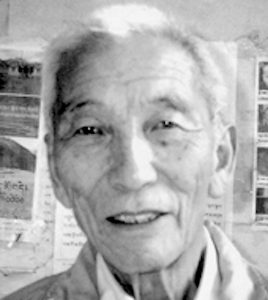
A German academic, Stephanie Roemer, interviewed a TUA leader, Chanzoe Ngawang Tenpa in April 2003. Tenpa claimed that this party was founded by Gyalo Thondup and was the first political party in exile. He outlined the three principal aims of the organization “1. Confiscation of private money to create a balanced economic class. 2. Neutralization of traditional class differences. 3. Unification of all religious sects.”[xxxiii]
The first aim appears to reflect the simple-minded admiration for Communist and socialist ideals that pervaded exile society in the sixties. The second is less a genuine political or social goal than the rationalization of TUA’s active hostility to senior lay/aristocrat officials in Dharamshala. For a time even the performance of the “Ache Lhamo” Tibetan opera was criticized by the TUA as being an aristocratic and feudal holdover.
The third aim underlines the hostility of TUA to the other schools of Tibetan Buddhism for not acknowledging Gyalo Thondup as their leader. The Kagyupa school in particular came in for attack. A number of Khampa and Amdowa groups that had broken away from Gyalo Thondup and the Chuzhi-Gangdruk, forming the “Thirteen Group” (Tsokha Choksom), regarded the 16th Karmapa Rinpoche as their leader. The fact that Kagyupa lamas were proving more successful in the West (and in South East Asia) than Gelukpas, added to the antagonism. For some years a very nasty anti-Karmapa campaign was carried out by the Tibetan United Association. Much of the demonization of GT’s enemies appeared in the Tibetan language newspaper, Freedom.
A Tibetan Women’s Association was also started in exile. It was modeled on the Lhasa Patriotic Women’s Association set up by the Chinese Communist Occupation authorities in Lhasa on March 4, 1954 and headed by Tsering Dolma Takla (the Dalai Lama’s older sister) and General Zhang Jingwu’s wife, Yang Gang. The Exile Women’s Association was essentially a pressure group and sometimes used to mob Gyalo Thondup’s perceived enemies.[xxxiv]
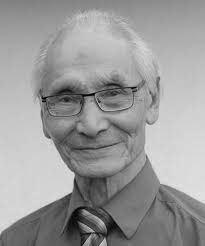
Gyalo Thondup’s point man in Dharamshala was, by some accounts, the secretary (drungche) of the Foreign Office, Narkyid Ngawang Thondup (then Tenzin Thondup) [xxxv], who managed the Foreign Office in Dharamshala in the absence of Gyalo Thondup. Narkyid initiated Chinese Communist style “self-criticism” meetings in Dharamshala. These were called “behavior validation” (kunchoe-dhakter ) or “behavior investigation” (kunchoe shibshe) meetings. Officials were required to participate and also study the accompanying manual published for the program. Stephanie Roemer writes “… in the early years, the exile Tibetan officials copied some forms of the Chinese political practice, such as monthly meetings of self-criticism. Such ideas were supported by the, at the time, influential elder brother of the 14 Dalai Lama, Gyalo Thondup.”[xxxvi]
There was a steady exodus of kashag ministers (and also other lay officials) from Dharamshala. Departmental reshuffles (layche khudu) were attempted to mitigate the situation.
SURKHANG, YUTHOK & TAIWAN
The soft-spoken, poker-faced Surkhang, the one kalon the Chinese could never quite figure out, the man “who held the Dalai Lama under duress” and “masterminded his kidnapping” as PRC premier Chou En Lai[xxxviii] put it, was hounded out of Dharamshala. He left for Britain and then the USA where he joined the University of Washington in Seattle. He left for Taiwan in 1972 where he and Yuthok attempted, unsuccessfully, to find support for the Tibetan issue with the government of Taiwan.
It was a mistake, perhaps even wrong, for Surkhang and Yuthok to seek political help from Taiwan which still claimed Tibet to be part of China. Surkhang and Yuthok’s stated aim was to change KMT policy on Tibet but they were unable to do so. Instead they ended up being used by the regime in its propaganda, and being vilified by their political enemies in the exile community.
It might be said in Surkhang and Yuthok’s defense that as Gyalo Thondup had established an exclusivity of relationship with India and the USA, there was no other nation or power, besides Taiwan, that was interested in the Tibet issue, and where they could turn to. One might also take into account the underlying fear they probably had about remaining in India, considering the fate of other “enemies” of Gyalo Thondup at the hands of the Indian authorities.
It might also be raised in their defense that they never made any statement supporting the KMT’s claims of Tibet being part of China. The KMT set up a “kalon” office for Surkhang and Yuthok, that the KMT initially called the “kashag” office, with which the two strongly disagreed, insisting that the real kashag was in Dharamshala. At the time the World Anti-Communist League was headquartered in Taipei, and the two Tibetan officials constantly raised the issue of Tibet in the League’s conferences and events. The two also regularly communicated with the Dalai Lama in Dharamshala, keeping him informed of their efforts, as a recent article by Surkhang’s daughter[xxxix] confirms. Yuthok’s biography provides facsimile copies of such letters to the Dalai Lama and the TGIE. Another article[xl] by Surkhang’s son and niece effectively challenges the charge made by Gyalo Thondup that Surkhang was just a Chinese “informer”, and outlines his role as the principal decision maker and organizer of the Dalai Lama’s escape from Lhasa in 1959.
The latest in this series of articles refuting GT’s allegations, which have all appeared in the Tibetan Political Review, is one by Kalon Yuthok’s son, Jigme Yuthok, that I mentioned earlier. What gives this article its credibility is the fact of Jigme being present at some of the crucial meetings and events that Gyalo Thondup recalls to slander or ridicule Surkhang and Yuthok . It might be noted that Jigme Yuthok was one of the most qualified English speaking volunteers working the for exile government then, being the first Tibetan graduate of St. Stephens, the premier college at Delhi University.
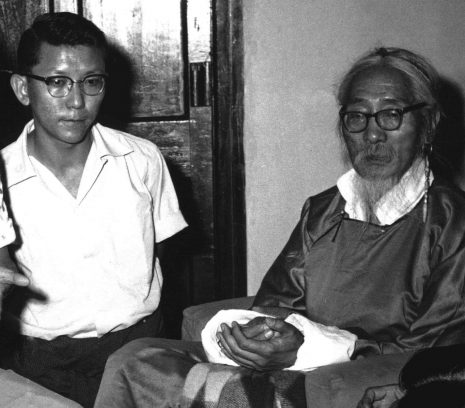
Surkhang and Yuthok’s efforts to get Taiwan support for the cause of an independent Tibet might once have been regarded as a hopeless gamble by two desperate officials. But considering present-day Taiwan’s own struggle to maintain its sovreignty from PRC threat and Taiwan’s genuine outreach and sympathy to the Tibetan cause, Surkhang and Yuthok’s actions might now legitimately be reinterpreted as a farsighted policy initiative, undertaken without in any way compromising the status of Tibet’s independence. It provides a stark contrast to the CTA’s Middle Way Policy, based almost entirely on unconfirmed assurances supposedly given to Gyalo Thondup by Deng Xiaopeng, that all other issues could be negotiated if only Tibet’s sovreignity were surrendered.
For a long time in exile society the issue of “eating Taiwan pay” (thaiwan phogzan) was used, often cynically to demonize a few aristocrats but mostly Khampa and some Amdowa leaders who opposed Gyalo Thondup. At least three murders are connected with this issue. When CIA funds and American support dried up in 1969, and Dharamshala became desperate for funds, every effort was made by the exile government to contact Taiwan and obtain financial support, even when the official policy of the KMT had in no way changed. I remember in 1973, as a Tibetan Youth Congress leader, exposing the kashag’s acceptance of a US$50,000 gift from the Mongolian & Tibet Affairs Commission office of the KMT.
GT himself received KMT money in a big way when he was a student in Nanjing. “President Chiang was a generous sponsor. He paid all my expenses and gave me a monthly allowance that allowed me to live in style.” That included … a comfortable three-bedroom house with a cook, servants and a car with a driver.” Even when the KMT were retreating from China, GT received considerable funds from Chiang to return home, which lasted him comfortably for a good many years.
GT justifies his acceptance of KMT money by claiming that “Chiang was willing for Tibet to remain independent. With the Dalai Lama running Tibet and me by his side.” (NMK 75) But that is self-serving fiction of a very cynical kind. GT was well aware that KMT policy regarding Tibet was unswerving in its claim that Tibet was part of China. Even after losing the mainland, and when the Tibet issue was raised in the UN in 1950 (and later) the KMT lobbied hard and successfully in New York and Washington to have the USA not acknowledge Tibet as an independent nation but merely as a victim of Communist oppression. GT was there in New York and experienced it all first hand.
Possibly, in terms of sheer quantity, Gyalo Thondup might accurately be termed the number one “thaiwan phokzan” or “eater of Taiwan pay” in Tibetan history. He claims that in 1964 he bought an apartment in one of the most affluent and ultra-expensive locations in Hong Kong (NMK 237), with the (seemingly never-ending) funds that Chiang had given him. .
SHOWDOWN
Once the political field in Dharamshala was cleared of Surkhang, Yuthok and other senior aristocrats, Gyalo Thondup’s takeover of the entire Tibetan power structure, whatever there was left of it, was assured. But at this critical juncture it appears that he somehow overplayed his hand. We are in murky waters here but from all the snippets of information (and frankly even gossip) that I accumulated over the years in Dharamshala (1968 to 1995), it appears that Gyalo Thondup was not entirely happy with the power he now controlled. To put it bluntly, he did not want the young Dalai Lama to concern himself with affairs of state.
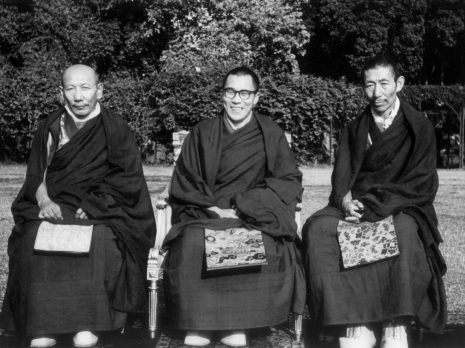
In order to isolate the Dalai Lama he demanded that the Dalai Lama’s two tutors, Ling Rinpoche and Trijang Rinpoche leave Dharamshala and resettle in Darjeeling, where GT insisted the hospitals and medical facilities were better. He then made suggestions that the Dalai Lama, being relatively young, should set aside politics for some years, and go to study at Oxford or Cambridge.
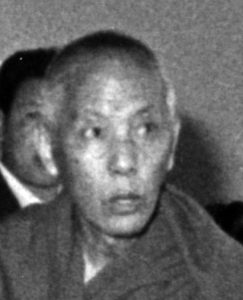
GT’s organizations now began to put pressure on those close to the Dalai Lama. They went after his principal secretary Kungo T.C. Tara, when he granted Yarphel Pangdatsang’s daughter Pangda Wangmo la an audience with the Dalai Lama. Earlier Wangmo la had been mobbed in Darjeeling by United Association and Tibetan Women’s Association members in that town, and had to be rescued by the local police. The TUA and the TWA now gathered a large mob before the “old palace” in McLeod Ganj, howling (in earshot of the His Holiness) for Kungo Tara to be dragged out of his office and beaten. A tearful Kungo Tara went before a very upset Dalai Lama to offer his resignation. A full account of this scandalous incident and the thamzing style struggle that Wangmo la was subjected to, is in Jigme Yuthok’s article[xli]
It all came to a head with a very nasty and epic confrontation between GT and the Dalai Lama, which no one in Dharamshala ever admits to knowing anything about. If you press hard enough you might get a mumbled aside or a hint of awful occurrences — but nothing more. It now appears that GT lost his temper with his younger brother for standing up to him. His Holiness is said to have lost his temper right back at older brother, Gyalo. When push came to shove His Holiness, of course, prevailed, but I think it affected him negatively for some time.
Somewhere around the late 1960s, Gyalo Thondup left Dharamshala for good. For a while he stayed at Darjeeling and Delhi, continuing his work with Indian Intelligence and the CIA. But after the CIA cut its funding in 1969, GT made his permanent move to Hong Kong. GT’s principal secretary Lhamo Tsering told me that he and Gyado Wangdu, the commander of the Mustang resistance force, were summoned to Gyalo Thondup’s house at the high-end Golf Links Colony, in New Delhi. “He told me and Wangdu that it was up to us to look after the Resistance Force. That he, Gyalo Thondup, was now just a businessman. After he left for Hong Kong he could not be contacted even though we tried.”[xlii]
AFTERMATH
GT’s departure from Dharamshala caused the shutdown of the Tibetan Foreign Office, though some of its work was carried on by other departments. There were stories of Secretary Narkyid collecting many hundreds of letters, memos, documents and resolutions pertaining to Tibet’s relations with the many countries and the UN, and locking them away in metal trunks. It is not clear on whose instructions all this was done.
Any initiative in Dharamshala to restart the Foreign Office was met with predictable hostility. Once in a while some political innocent attending the annual general meeting (Lokhor Lendom) would feel inspired to suggest that what the Tibetan struggle needed for a political breakthrough was a “Foreign Office”. He would be savaged by TUA members and others in the meeting. Even when Gyalo Thondup was a thousand or so miles away in Hong Kong, the Foreign Office was his exclusive turf – and his only.
Without Gyalo Thondup’s CIA and State Department connections, there was little the Dalai Lama could do personally to promote the Tibetan issue in the world. He lived in isolation in Dharamshala and only visited the USA in 1979 – twenty years after he had first come into exile. Even the Indians had by now begun to ignore the exile government. It got especially bad during Indira Gandhi’s rule when some low-level undersecretary from the Indian FO would be deputed to receive the Dalai Lama whenever he travelled to Delhi. During the “Emergency” his travels were strictly restricted. To be fair to the Indians, Dharamshala made no effort at outreach, even to the Indian intellectuals and national figures who had earlier been enthusiastic supporters of the Tibetan cause. The exile government withdrew into a collective shell.
I was in Dharamshala during those years. It felt like we were all living in a kind of political limbo where you could only discuss issues of resettlement, education or religion – but never Tibetan independence. The new ministers of the kashag were loyal, honest and hardworking people, but had no political experience or sophistication, not even of a traditional kind. They were former stewards, estate managers, monastic officials and so on. And in any case GTs proxy organizations were still there. So you kept your head low, just in case.
His Holiness had his spiritual advisors, but no experienced senior official or scholar to provide him political or intellectual guidance, especially in world affairs. The Irish travel writer Dervla Murphy who met the Dalai Lama in 1963 wrote that “…he was unsure of himself in dealing with foreigners.”[xliii] Understandably enough, His Holiness appears to have gone into a depression of sorts, though evidence for this is spotty and largely circumstantial. When he first came to Dharamshala he liked playing badminton, even “…trekking in the nearby Dhauladhar Range.” but seems to have dropped these pastimes.
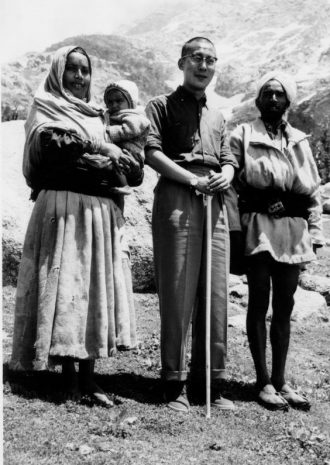
The Dalai Lama also admits giving up his regular English lessons, for which “… very generously, the Indian government had provided me someone to give me regular coaching”[xliv] The Dalai Lama frankly admits that later when travelling abroad and making “embarrassing mistakes” in his English he regretted “…not working harder when I had the opportunity. His Holiness makes it clear how he saw this depressing chapter of exile history “… for almost fifteen years the Tibetan refugees entered a period of darkness.”[xlv]
Those who insist on the Dalai Lama’s supernatural omniscience will scream blue murder at me, but I see His Holiness then as a very young and confused man, betrayed, without knowledgeable counselors and, quite frankly, out of his depth. How could anyone not have become depressed, considering the circumstances? Yet he did not throw up his hands, abandon his political and spiritual duties and take off for Oxford as had been suggested to him. Instead, he overcame his problems and worked to provide exile society the leadership under which much was achieved. All the Tibetan schools (including TCV), settlements, monasteries and such important institution as the Library of Tibetan Works and Archives, the Tibetan Institute of Performing Arts, Tibet House, the Tibetan Medical Center, and of course the exile Parliament were established during this “period of darkness”.
His Holiness has long been upset and angry at my critical writings about his administration and his disastrous Middle Way policy, but I will always recall with real pride those years I served under him, and came to appreciate how his “presence” and inspiration kept our fragile community together during that long period of political stagnancy.
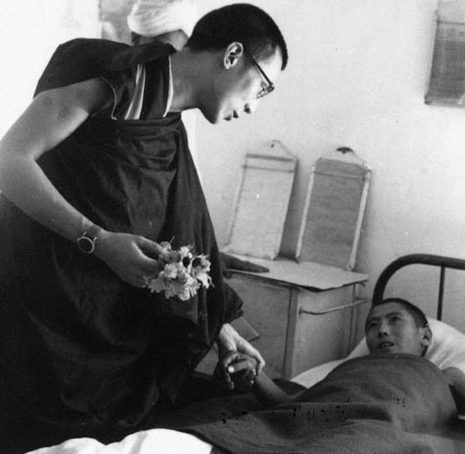
Only in the late 1980s, after Deng’s “Liberalization” policy, and the opening up of Tibet, was an “undercover” Foreign Office finally set up within the existing Information Office. It was renamed the Department of Information and “International Relations” (DIIR). I was there in Dharamshala at the time and, I could be wrong here, but it seemed to me that those officials involved (Lodi Gyari and Sonam Topgyal Zechutsang) were holding their collective breaths (for possible TUA and TWA reaction?) at the launch of the new office. But everything went smoothly. Indeed, the creation of the DIIR was most timely, even opportune, as the Tibet issue once again began to resonate internationaly, with major uprisings taking place in Lhasa from 1987 onwards and, of course, with the Dalai Lama being awarded the Nobel Peace Prize in 1989.
A couple of years later Gyalo Thondup came back to Dharamshala from Hongkong. But that is another story.
_____________
I should make it clear that for a long time I was an enthusiastic and loyal supporter of Gyalo Thondup. Though I was not unsympathetic to the politicians of the ancien regime, it was evident they had outlived their usefulness. Many young Tibetans then, such as myself, saw GT as a dynamic and forward-thinking leader who could bring about the changes our society desperately needed. And Gyalo Thondup’s contribution to the struggle were undoubtedly significant: obtaining CIA support for the resistance (though Taktser Rinpoche made the initial connections), creating the Special Frontier Force with Indian and American cooperation, setting up the Office of Tibet in NYC, and Geneva and more. But in retrospect many of GT’s achievements were premised entirely on American support and finance, and the moment that ended he dropped the struggle, just like that – without so much as a by your leave.
I think many of us would have overlooked GT’s shortcomings and supported him loyally if he had stayed on. But he did not even make a half-hearted attempt to work out alternative strategies or seek out other sources of support and funding. Instead, after taking a wrecking ball to the exile political administration, Gyalo Thondup packed his bags and – leaving behind a devoted wife, family and followers – departed for Hong Kong and life anew (reportedly with a Chinese “concubine”) at his posh residence on 26 Magazine Gap Road.
GT saw himself as an international financier and (according to a close associate) began to dabble in the reputedly volatile Hong Kong commodities market where, so the story goes, he lost his shirt. This probably included the last installment of Chiang’s bounty, Yabshi family funds and perhaps even CIA funds that some GT critics claim he misappropriated. Some years later Gyalo Thondup opened a large store on 693 Madison Avenue, NY, with money reportedly borrowed from the Private Office of the Dalai Lama, but this venture also went under.
Perhaps the suggested humbleness of the autobiography’s title was intended to reflect GT’s present financial situation. But readers can probably rest assured that His Holiness and other family members will see to it that Gyalo Thondup does not have to wholly depend on make noodles for a living in his twilight years.
(I must thank my late uncle Tethong Sonam Tomjor, the late Kungo Niushar Thubten Tharpa, the late Kungo Phala Thubten Woeden, the late Kungo Jampa Tsondue and my late father-in-law, Kungo Lhamo Tsering, for many revealing insights. Two of Gyalo Thondup’s close associates provided valuable information. I must especially thank my old friend Tashi Tsering la, founding director of Amnye Machen Institute and the leading scholar on Tibetan history and culture, for sound advice, flawless facts and figures and meticulous fact-checking. To Christophe Besuchet who has maintained this blog-site for nearly a decade and effectively dealt with so many problems it has faced, including trolls and hacks, my eternal gratitude.)
NOTES:
[i] Shakabpa, Tsepon Wangchuk Deden. One Hundred Thousand Moons: An Advanced Political History of Tibet Vol 2. Trans Derek Maher, Brill, Leiden, 2010. p1041
[ii] Dalai Lama, Freedom in Exile, Hodder & Stoughton, London, 1990. p153
[iii] Bureau of HH the Dalai Lama, Tibet In Exile 1949-1969, New Delhi, 1969. pp 265-266. This early TGIE publication states that the foreign ministry was created September 2. 1960 and two directors, “Mr.G Thondup and Mr.TT Niushar” were appointed.
[iv] Takla Phuntsok Tashi, Mee-tsae Jhungwa Jodpa Vol. 2, Library of Tibetan Works and Archives, Dharamshala 1995. pp. 339-340. Yuthok Tsering Dolkar, Yabshi Yuthok Sawang Dhampa Tashi Thondup Chok Ghi Kutsae Jhungwa chelong tsam ma Chos Lhug par Jod pa shuks so, AMI Books, Amnye Machen Institute, Dharamshala, 2002. p.43
[v] Kazur W.G Kundeling, Mi tshe’i lorgyus las ‘phros pa’i gtam thabs byus snying stobs kyi ‘bras bu, Published by his family, Rajpur ?, 2000 ?, Vol. 1, p.299
[vi] Yuthok Jigme Dorje, “Yuthok’s Rejoinder to the Noodlemaker” Tibetan Political Review, July 30 2016. https://sites.google.com/site/tibetanpoliticalreview/articles/yuthoksrejoindertothenoodlemaker
[vii] Dalai Lama, Freedom in Exile,166.
[viii] The Tibet Museum (DIIR), Tibet’s Journey in Exile, Department of Information and International Relations, Dharamshala, 2008.
[ix] This will be the third part of this series tentatively title “The Return of Gyalo Thondup”
[x] Portraits of the first exile kashag were also displayed in the corridor of the kashag office in Dharamshala. In the 1990s when Mrs Yutok when visiting the office she saw the photo of her late husband missing and asked the concerned official to rectify this. She was asked what proof she had that Yuthok was even in the kashag. This was during Samdong Rinpoche’s first term as Kalon Tripa.
[xi] Dalai Lama, Freedom in Exile, 58.
[xii] Dalai Lama, Freedom in Exile, 58.
[xiii] Yuthok, Yabshi Yuthok Sawang Dhampa, 44.
[xiv] Jhampa Tsundue was a monk official. I met him Sikkim in 1984, when he was the Representative of the Dalai Lama at Gangtok, and I was leading TIPA on a tour there in 1984. He was kind enough to host a dinner for me at the Hotel Tibet where he gave me detailed account of the Dalai Lama’s gold and silver. Lhamo Tsering (in Vol 1 of Resistance, AMI Books, 1992, p.15) mentions him as a senior member of GT’s Tibet Welfare Society (bhod ki dedon tsokpa).
[xv] Henry S. Bradsher, The Dalai Lama’s Secret, and other Reporting Adventures, Louisiana State University Press, Baton Rouge, 2013. P39
[xvi] John F. Avedon, In Exile From the Land of Snows, Knopf, New York, 1984. p91
[xvii] John Kenneth Knaus, Orphans of the Cold War: America and the Tibetan Struggle for Survival. Public Affairs, New York, 1999.p 122.
[xviii] https://fr.wikipedia.org/wiki/Tibetan_Freedom_Press
[xix] Dalai Lama, Freedom in Exile,168
[xx] Sadutsang Rinchen, A Life Unforeseen: A Memoir of Service to Tibet, Wisdom Publications, Somerville MA, 2016, p. 241-248.
[xxi] Bureau of HH the Dalai Lama, Tibet In Exile 1959-1969, x-xi.
[xxii] Sadutsang, A Life Unforeseen, 241-248
[xxiii] Paljor Tsarong, “A Factual Account of the Tibetan Governments Gold and Silver” Tibetan Political Review https://sites.google.com/site/tibetanpoliticalreview/articles/afactualaccountofthetibetangovernmentsgoldandsilver
[xxiv] ibid.
[xxv] Knaus, Orphans of the Cold War, 122.
[xxvi] https://www.treasuryoflives.org/biographies/view/Yampel-Pangdatsang/13523.
[xxvii] Constitution of Tibet: Promulgated by H.H. the Dalai Lama on March 10th 1963, Bureau of HH the Dalai Lama, New Delhi, 1965 edition.
[xxviii] A full account of this “exposure” and shutting down of other political parties by GT’s United Association will be discussed in a later installment of “Untangling a Mess of Petrified Noodles”.
[xxix] Interview with Kungo Barshee Jan 5, 2015
[xxx] In Lhamo Tsering’s account, he mentions Rolex watches being dropped with arms drops. Perhaps to bribe Chinese officials? Lhamo Tsering (in Vol II of Resistance, AMI Books, 1992, p.15)
[xxxi] CPC slogan “yi dou, er pi san gai” (Struggle, Criticize, Transform). In Tibetan “thap- ga- choe sum”.
[xxxii] Carole McGranahan, Arrested Histories, Duke University Press, Durham London, 2010. P147.
[xxxiii] Stephanie Roemer, The Tibetan Government-in-Exile: Politics at Large. Routledge, Oxford, 2008. p72.
[xxxiv] The Tibetan Women’s Association (TWA) was disbanded in the 1970s after numerous scandals. But in 1984 (Sept 10th) was reconstituted on the direct instructions of the Dalai Lama. The organization resumed its role as a pressure group for the TGIE and in that capacity began physically assaulting Tibetans who had spoken out against the Dalai Lama, Gyalo Thondup or the exile government. The TWA claims it was originally founded on March 12, 1959 in Tibet by the Lhasa women who took out the demonstration against the Chinese on that day. But that is fiction.
[xxxv] Bureau of HH the Dalai Lama, Tibet In Exile 1959-1969, New Delhi, 1969. p266.
[xxxvi] Roemer, Government-in-Exile, 89
[xxxix] Jampa Yangchen Surkhang, The truth about Surkhang Wangchen Gelek – Part 2, Tibetan political Review, Aug 6, 2015, https://sites.google.com/site/tibetanpoliticalreview/articles/thetruthaboutsurkhangwangchengelek-part2
[xl] Chunden Dolkar and J. T. Surkhang, “The Truth About Surkhang Wangchen Gelek”, Tibetan Political Review, Jul 20, 2015. https://sites.google.com/site/tibetanpoliticalreview/articles/thetruthaboutsurkhangwangchengelek
[xli] Yuthok Jigme, “Yuthok’s Rejoinder..”
[xlii] Interview With Lhamo Tsering (Codename “Larry”, Alias Drunyik-La) On 17th & 18th September 1991 At Delek Guest House, Gangchen Kyishong, Dharamshala, H.P. India.
[xliii] Murphy Dervla, Tibetan Foothold, John Murray, London, 1966, p 106
[xliv] Dalai Lama, Freedom in Exile. 163
[xlv] ibid 182
[xlvi] ibid 182

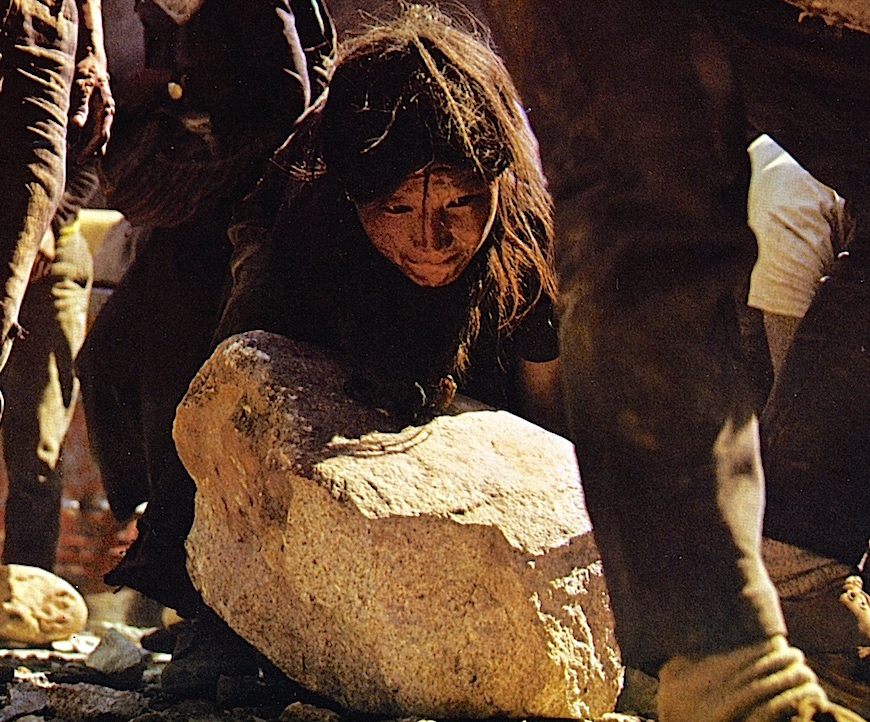

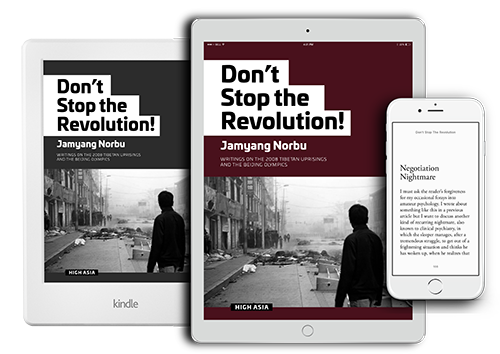
Superb writing and research! It is very important to keep the records straight, if not for the present generation, then maybe for the future generation far removed from the today’s politicking.
Another well researched and eye opening article.
bow,bow,bow to you Mr.Norbu.
By the way does any one here know of Lodoe Gyari stealing couple million dollars donated to HH the Dalai Lama?? Is it fact or just rumour? Where is lodoe gyari? Did he retire in Bejing or Shanghai? After all those supposed failed negotiations with his uncle China…hahahaha
Professionally and factually documented article by Khewang Jamyangla. The article is a first and one of a kind written by a reknowned Tibetan journalist – openly and bravely written on the controversial Mr. Thondup.
There is so much more that GT has been guilty of, and I must say Jamyang la has rather been soft in this regard. His article is indeed excellently written and sourced.
Yet another straight and fact finding write up of JN la contributing great insight to make people aware of fact. Often, our society are run on bullying and on basis of power and pressure. Historically, these facts are very important. I always read all most of your writing that are well research and in full freedom. We should understand and must be aware of right and wrong both. Thank you JN..
Powerful facts and historical period review. Thank you for your work. The younger generations, like myself, are often without a clear light when it comes to understanding the historical aspects and the powerful personalities there was at play in those years from 1960s to 1980s. I grew up in a fog of big names, fear of authority and need to comply with the common mentality which I despised because I could not understand it all and there was no way of understanding anything beyond what was visible which was hard to accept. So I am grateful for this light.
This article agains shows JN and other kudra versus GT, the fact can never be know given JN’s own political and historical biases! JN posted picture of people working in deplorable condition, yet he hides his own and other elistist aristocratic laving lavish around the world, JN in Kalingpong on a $1000000 estate as reported.
Common Tibetans were manopulated and played like expendable bullets by elites and their descent who claim to be th vanguard of Tibet.
NG
Ghostly respectful attitude of Tibetans for the 14th Dalai Lama: Pocketing the state treasure then, leaving him alone in Dharamsala now!
NG, you put it right. GT failed Tibetans, but JN’s clouts are no less.
Why is Jamyang Norbu silent about his own father-in-law Lhamo Tsering, who every Tibetan calls “Drungyik Lhamo Tsering” (“Drungyik” is “secretary of Kungo Gyalo Thondup”)? Every one knew Drungyik LT was Kungo Gyalo’s “Right-hand man” and a point person. But JN mentions LT (father-in-law) only in a passing remark. Is this the norm for writing a credible history?
Gyalo Thondup and Drungyik Lhamo Tsering were like Jai and Veeru of the epic Hindi movie Sholay, who lived and died singing “Hai dosti.. hum nahin chorengge……” Now, after JN’s marriage to LT’s daughter, he is attempting this impossible act of tearing them apart to tell his own version of the story. LT has passed away and GT is old and whacked up by JN’s articles and clout’s groupism. now, why would JN not let them die singing “Hai dosti…..” together, at least? JN may not value friendship; GT and LT may.
Bigger joke is that why would JN bring in this decrepit, skinnny, old Kungo Narkyi Ngawang Dhundup in this play? He is no more than a small-time low-level pre-59 Tse Phodrang staff? Leave him alone. Better not take advantage of his old age, poor vision and hard hearing! It is sinful!
My point is: Narkyi is a not a suitable sub for Drungyik Lhamo Tsering la! All pre-1959 guys know this!
Thanks Jamyang Norbu la. Lot of points to ponder. About that “epic confrontation between GT and the Dalai Lama”, where, in the end, Gyalo Thondup backs down, up and leaves, never to play politics again. Odd reaction if he were merely in it for himself. Did he do something noble there or did I go wrong somewhere?
As always, honest and straightforward to the point. I would like one of the comment or; NG to do research on the author and his family background before commenting as personally know the author.
This article is a very well researched and softly written as compared to many that the same had worked in the past. Kudos and excitedly awaiting the untangling of diaspora Thukpa.
What a treasure of information that many of us younger generation have been blinded to or been hidden away from us. Jamyangla has explained very articulately and methodically on how this monsterrous Gyalo Thondup began consoliding his power in exile. GT’s viciousness and maifioso means in destroying many people’s lives in order to remain center stage is most telling in this insightful article. Bravo!!
This article hardly suffers any critics. Unearthing truths is a great service – purification of a contaminated history – much greater than any philanthropy work. Because it’s rescuing next generations from misleading into a biased and false history of their land and people. We, contemporaries, owe a responsibility to hand over an objective history to future Tibet, and Jamyang Norbu is fulfilling this.
Bagwad Gita says mixing personal interests with social interest makes one’s services contaminated and impure. This is what exactly GT suffered – it seems. Thank you JN.
“A shorter and PERFUNCTORY study of the initial power struggle in exile ” rather than a “detailed dissertation” turns out more REVEALING of the ‘Arrested Histories’ of this dark & chaotic period.
There must have more stories why Mr Gyalo Thondup la left without forming anyone on his experience for the appointment which concern every one of us Tibetan. This is not normal of the man of state.
There must have more stories why Mr. Gyalo Thondup la left without forming anyone on his experience for the appointment which concern every one of us Tibetan. This is not normal of the man of state.
A great and in depth research on all accounts. A factual account and true and straight forward story.
Ever since his book came out, no wonder Gyalo Thondup is silent ever since, his only purpose of writing the book is self promoting and blowing one’s own trumpet, as loud as possible hoping to fool the public, but then it backfired him, in almost every account he was exaggerating or making it up weaving through this labyrinth path relentlessly till the end.
In the book, he talked out Chiang Kai shek gave him $50,000.00 for personal use. Is there any truth in it? was he making it up and who really knows that Chiang gave GT the money, he has any approve that was true story and it happened, because if Chiang treated GT like “dropped son” which GT claimed, why Chiang did not bother to meet GT when he visited Taiwan in 1970s after ten years or so not seeing him? To me that was excuse so he could tell others, that’s how I became wealthy, having four huge houses in four places and lived a luxurious life meanwhile rest of the Tibetans refugees struggled to survive with Rs.100 per month working for Tibetan government. Where was the gold any way that he had control?
Welcome the well-researched document and for bringing fact to a lot of fiction.Time Tibetans know the truth.
Lhamo Tsering la, what I know of him was a quiet, soft-spoken man and an honest man. Like Dudul N. Tsarong, my father, they were similar and real gentlemen. They would not go against Gyalo Thondup’s words although my father said that he did advise GT, but he would never listen to anyone.
Narkyid Ngawang Thondup was very close to GT in the early years. He did initiate some Chinese Communist ideas in exile. He also started a “ Servant’s Association” in Dharamsala, and stated that no one should take their family names, which was targeting the old Ministers and former Government officials, but at the end he took the name Narkyid, which was the family name of a government official in Lhasa. His father was the Steward of this family.
Ngawang Thondup la was educated in the Beijing Minority School in China, if I am not mistaken. There were quite a few government officials who did not like the backward, old Tibetan government system and wanted changes. Some of them thought that the Communist system seemed to be the only way changes could be made. At first NT was in awe of GT’s more modern thoughts and supported him.
These articles by Jamyang Norbu la put me in the motion to express my opinions to make some things clear for our younger generation of Tibetans. We are at a time there is so much to do and one does not read history books. Tibetans in general are not readers beside the dharma texts.
There has been much misunderstanding about the KUDRAK. Young Tibetans have asked me at my talks, “ What is your opinion of Kudraks giving our country to the Chinese?” I reply, “ Read Tibetan history. Kudraks are people; there were good and bad. Some government officials did scheme and create disunity in the country to serve their own purposes, but they were not traitors.
After all such people in power are everywhere in the world and we are not Bodhisattvas. It was the monastic community and a handful of conservative government officials with Chinese influence and donations that we did not open up our country to the outside world. The Chinese said Buddhism would be lost if we did, so we isolated ourselves and had no idea of the world outside of our limits. The people who wanted to open up Tibet to the international world were unable to do so. They were labeled traitors. Thus we lost our country.”
Now to elaborate on this, China says that they came to Tibet to liberate the masses from the Landlords, Lamas and the imperialists. This statement was spread all over the country and outside. Who were the imperialists? Were the landlords and the Lamas really cruel?
In exile, Gyalo Thondup la and his followers were the main persons to spread the word that the Kudraks were the one’s who sold our country to the Chinese. This was on the same line the Chinese used, and GT used the same message to get the few influential and intelligent Government officials like Surkhang, Yuthok, Phala etc. out of Dharamsala so that he could have control of the Government.
A person of power know how to bull in our society but very poor with non Tibetan.
The fact that Jamyang la researched this article so well and thoroughly and put his personal opinion aside to give us the true picture made me feel that I was experiencing the events all over again; like watching a movie that I’ve seen before superficially, but this second time in more detail. And like the movie, I have been in the background playing the part of the “extra”, witnessing everything happening but having no influence as to the course the story takes. I especially like the very rare picture of His Holiness in civvies.
Jamyang Norbu did a good thing. laid the actual facts out there. If nothing else – atleast made sure the young kids growing up nowadays will know what was the situation those dark days. I saw some youth reading the book and getting all fired up thinking that they really learnt something. Just felt nauseous within. Time to heal and time to repent.
i would like to make a note that there is nothing much in the past to be politically proud of being a tibetan.And there is no need to read the deeds as its quite obvious from the present situation that past generation was pretty much fked up..that includes kudrak and monastics both. good kudrak bad kudrak good lama bad lama all responsible for their action and inaction.story katam.
There is nothing wrong with young people reading the Noodle Maker. As been noted, Tibetans are generally not readers, we’re more singers and dancers, so reading anything is a plus. This above all, if we truly care to be well informed then its essential to read people we disagree with and not just accept the words of anyone, including JN. I have no doubt JN would agree with my opinion in this.
http://www.theglobeandmail.com/news/world/the-g20-summit-an-exercise-in-chinese-public-relations/article31704488/
Jamyang Norbu la, thank you for shedding light on this sad period of our history. Personally I have known a number old Khampas, some who had sacrificed everything for Tibetan freedom and their beloved leader HHDL, who later were ostracized by the Chikdril Tsokpa (TUA) and their like, and had to suffer the humiliation of living the rest of their lives labelled as traitors, all because they had opposed Gyalo Thondrup and his actions.
If not for GT’s own book, giving you and others the opportunity to put the record straight, these events which has long been swept under the rug, would most definitely have died, as have these brokenhearted elders. So thank you on their behalf, at the least some of their future generations will know that these brave people were not traitors, but in fact true patriots and true followers of their beloved leader.
I must congratulate the very courageous and admired Mrs. Namgyal Lhamo Taklha, sister-in-law of HH the Dalai Lama. Namgyal la’s statement in this unprecedented article by Jamyang Norbu – corroborates exactly what went wrong with Mr. Gyalo Thondup. Namgyal’s late husband is the highly respected and esteemed Mr. Lobsang Samten, immediate older brother of His Holinesss, the Dalai Lama.
GT was all for himself. Initially he began with good intentions, but soon greed good got the good of him, and he wanted to run the whole show all by himself. In his thirst for power, he didn’t give a hoot if it meant people’s lives were destroyed. Many Chushi Gangdruk men suffered severely from GT’s hands – having the Indian government slap false charges on them. The well known Chushi Gangdruk leader Sadu Nyenda and his family had to flee, and take refuge in Bhutan for decades from fear of GT.
Men like Narkyid Ngawang Thondup today shroud thier hideous past, but find him guilty by association. It is because of minions like these that aided GT in his rampage for power, and destruction of dedicated honest people’s lives. These characters remind me of having similar tunes to Hitler’s SS cadets – do whatever the Boss says unquestionably with absolute ruthlessness.
18. NAMGYAL L. TAKLHA | SEPTEMBER 16TH, 2016 | 1:39 AM
Art of washing hand away – Disclaimer for justification.
“Such things exists even in other countries as well; not just our Tibet” is the best justification/defense one, conveniently, offers when questioned about Kudrak’s accountability for loosing country. What a cheap escape..!! How easily has put it across.. as if not millions, but only few yaks were killed by chinese invasion, and moreover, as if, China is about to give Tibet back tomorrow.
Why the hell – in what God’s name we should compare with its counterparts of other nations..? Authorities in other nations, though cruel for masses, but were competent enough to defend the country against foreign invaders. Were we too so..? No.. hundred times ‘No”. Those kudraks just packed up their golds which they confiscated from any commoner and ready to flee. So comparison failed to justify. Please don’t compare and insult the brave Pawo/ Pamo’s lives gave for Tibet. I admit, in case of other nations, magnitude of cruelty is much higher than ours. For this, credit goes to Buddhism; not to those clinging to power; and Buddhism is not their (so and so) fathers’ property. Authorities in other nations are politically competent and always well prepared to defend country against any expected foreign invasion, though cruel to masses. Why don’t we compare in this line also..?? They were not like our then sheep kind of leaders who realized only after invasion that the country has been taken away. Atrocity of rulers is one thing; whereas invasion is another thing. No matter how cruel a ruler is, there will be a way to bring him down to ground on one fine day. But nothing much is left there to do if country is lost to other foreign invader.
We are not buddhisatvas. Agreed. But we are better exposed to the stuffs of buddhichitta. So shouldn’t we be better than others.?
And that reluctancy to open up to outside world is mainly because of fear of losing power by democracy; not because of losing Buddhism which Chinese might have advised.
Agreed that all Kudraks were not corrupt. That’s very much possible. Nothing to wonder. Its not about good and bad. Its about competency of leaders to defend country. Those, Kudraks, know only enjoyment of power; not art of defending country by using that power. This is the crux.
In general, people don’t accuse that Kudraks sold Tibet to China for their profit. But its a more sort of frustration that their inability/ incompetency as a leader to safeguard country led to invasion. And that’s well justified. Along with having enjoyed the right of authority/power lavishly, there existed a duty to protect the nation also. They, kudraks, succeeded in enjoying right, but failed in the duty of protecting nation.”
Clans of Kudrads should have the courage of admitting this to honor the people and nation this time, even one falls under good kudraks category also; not washing hands by justification attempts.
So coming generations are entitled to known exactly what went wrong in plain mirror of black and whites, whereas the contemporary is obliged to tell History of truth – not fiction which unfortunately we have inherited one.
Now wait a minute, what about the historical facts on the suffering of Common folks…still being ignored by the kudak clan and their kids …just writing stuff to blame each other to confuse the younger génération. I dont give a sht on what You Guy have to Say….You Guys should serve HH for atleast 10 lives for saving your butt from us.the grandparents of yours surelyare in hell for riping off not those Common folk but their kids on refugee who were psychologicallymolested at their prime age to divert their attention.
I think we have beaten this horse, Kudrak verses Serfs to death and as an offspring of a long line of Serfs myself, I can understand “Kunchok’s” concern for us, yet we need to put this tussle to rest.
It is a fact that, even in exile Chinese propaganda is still playing mind-tricks on us.
The other point to mention here is that in the past Tibetan society, the status of “Kudrak” was very fluid and a commoner could become a “Kudrak”, case in point Mrs. Taklha’s Grandfather Dasang Damdul Tsarong and many family members of current and former HH Dalai Lama’s. Traders from Kham and Amdo have also become “Kudraks”. Therefore, I do not know of any way to pinpoint a social class called, “Kudraks” and take my frustration and anger out on them for treating us “serfs” badly. One thing that Kunchok fails to mention is monk “Kudraks” who in my opinion have played a more sinister role in oppression the commoners than the Lay “Kudraks”. In the name religion, they have lent money for profit (they still do in exile) confiscated property and lands and play dirty politics by sleeping with our enemies. Case in point the Shungden Group who recently was funded by Communist China.
So I have to agree with Mrs. N.L. Taklha, put the past behind us, and look to the future. Here too the path is not going to be a bed of roses, there shall be thorns too. Weather we are, Khampa, Amdo, Kudrak, or Serfs Tibet is our homeland and we all have to work together to get the Chinese out of our Fatherland.
My compliment to the author for the piece that clearly narrates years of our history and the first fifteen years of our most difficult period in exile, under arduous circumstances; trying to make ends meet and rise from the ashes. Rise we did with many of our Bhodrig pundhanam, under the leadership of our most precious leader, His Holiness the Dalai Lama. Never before did our gang chen pas suffer so much and yet achieved a lot. Today we’re on the global platform.
May I bring to your attention that there is one line here that I refute “Dasang Dadul Tsarong was struggled and died in prison.” This ain’t true as far as I know. He died in his prison cell just the night before he was to be struggled the next day. I was in Tibet at the time — five years older than Xi Jinping — and we saw the thamzing of Lhalu on movie screen. We had learned that Tsarong was the next to be struggled, and so forth but managed to escape the torture and humiliation. Om mane padme hum.
Gyalo Thondup just fooled us and trying to fool us again? Not too fast Mr. China man. Just keep quite and retire in Beijing now since you fulfilled your mission to give up Tibetan Independece. You lied about Deng proming anything other than Independece. I hope you will suffer in hell for creating hell for ordinary Tibetans.
An honest author after realizing mistakes will make amends to keep the facts straight. I hope that Ann Thurston, if you are reading this, that at least you will apologize for the co authorship of such a false and malicious book NMK.
I feel that in retrospect Thurston has a partial responsibility in spite of her disclaimer, for co-authoring or allowing such slander and pain on so many innocent people and their families. This has caused much disunity in our society with such outrageously incorrect statements. Thurston should have researched and cross checked more thoroughly, before participating with a highly controversial man.
I am hopeful Thurston as a consciousness journalist has heard much outcry by now, and discovered many of the stories of GT are completely untrue and hidden from her. Because Gyalo Thondup will obviously not apologize for this ludicrous book, Ann Thurston bears a moral if not a legal responsibility to issue a statement of apology to those her book has inflicted.
Ann, please allow the souls of the dead who couldn’t defend for themselves to at least rest in peace. We cannot allow such false history to degenerate into our society, and for the sake of posterity please do the right thing as a true journalist.
29. Chewang la, you are right about Tsarong dying the night before his public trial and Thamzing. His bio by his son DN Tsarong, mentions that clearly. Thanks for pointing out this error. Glad you found the post interesting. I read your review “Another Noodlemaker of Kalimpong” and thoroughly enjoyed it. I would highly recommend it to everyone. Check out: https://sites.google.com/site/tibetanpoliticalreview/articles/anothernoodlemakerofkalimpong
Why should Ann Thurston give an apology? Thurston did a great service by helping GT’s write his version of recent Tibetan history, even though it is as biased as JN’s articles. This how contending narratives struggle to control public consciousness. Writers must instead first look up dictionary for meaning of “disclaimer”, which Thurston made a half a dozen in NMK. So no need for apologies, Ms Thurston.
NOW, LEMME SHOW YOU HOW JN WRITES TIBETAN “HISTORY”
I think JN’s piece is biased because
– JN conceals involvement of his own late father-in-law
Drungyik Lhamo Tsering la (GT’s secretary) who was
hand-in-gloves with GT. MNK, the book JN criticizes,
mentions JN’s father DLT more than 30 times and calls
him “GT’s Deputy” in all these controversies. JN portray
his f-in-law differently and even Semokusho Namgyal
Lhamo Takla voiced to certified the noble characterization.
– JN instead replaces his father with an old small-time, Tse
Phodrang staff Ngawng Dhondup Narkyi. Unfortunately,
MNK does not mention NDN even once and GT might
not know him up close. But JN jumps on him with fast
punches (boomboomboom! very fast!) and NLTakla
shoots a flick kick from the side rings.
Let’s imagine this situation: We all go and watch the Hindi blockbuster Sholay. Then one guy later re-tells the story of the film, but minus the favorite Dharmendra. He tells a story where Amitabh sings “hai dhosti……” with comic Asrani crooning on the sidecar. What do you think? Or, let’s put it this way. What if someone tells you the story of MenInBlack, minus our favorite Tommy Lee Jones. To make things worse, this story-teller pairs Will Smith with the less active agent Richard Hamilton. How do you take it?
This is exactly what JN is doing in his re-telling of the modern history. He tactfully retells the story by extricating GT from his otherwise inseparable partner: JN’s own father-in-law Drungyik Lhamo Tsering la, who is also from the same region of Amdo. NMK presents Drungyik LT as “Gyalo Thondup’s Deputy” and mentions him more than 30 times in NMK. The duo were hand-in-gloves in the activities of Mustang, 22, Chikdril Tsokpa and others, which JN paints negatively as GT’s doings. Yet, in this article JN replaced his father-in-law with a small-time Tse Phodrang official Ngawang Dhondup Narkyid and builds a new story line. GT does not mention ND Narkyi even once in his NMK and might even not know him in person. So what does this say of JN’s “history”.
Let all be reminded that it was JN’s f-in-law DLT who climbed the political ladder under GT’s grace and held high positions such as defense secretary, a post GT gifted to other opportunist Amdowas and Khampas who he made Dhapons and army Political Officers (PO). All these guys climbed the Tibetan political ladder and had the best for themselves and their families and relatives. But what about Narkyi ND? Hard in his hearing and poor in his vision, he is still the same small-time, Tse Phodrang official. Let me remind Ms NL Takla that it was the Kudrak who always identified Tibetans on the basis of their regions and family roots, and chose to tag this old man with his family name “Narkyi”. This is an old Tibetan Kutrak way of tagging and profiling Tibetans on the basis of family ties and power affiliation. If you get someone’s family name, you can pull up their records in a second. For Tibetans, their future life, career and success, to a great extent, rest in their surname and their membership to an invisible clique. Being a bastard of one of the Kutraks with names like Yawala, Ola, Awala, or Sey Kusho sell better than a degree from IIT or NIT in our community today.
After JN’s marriage into DLT’s family, everything changed. A good son-in-law, as he is, he succeeded in extricating his father from the controversies.
LET ME GIVE YOU ANOTHER EXAMPLE:
In his previous article, JN wrote that His Holiness’ father died of sickness, possibly “cancer of the stomach’. His argument was to disprove GT’s allegation that his/His Holiness’ father was poisoned and did not die a natural death.
DLT, JN’s father-in-law, supported GT’s statement in his Tibetan book “Tsangol Gyalkyob”. He wrote that GT/HH’s father died neither of sickness nor a natural death, but fell victim to vengeful plots. Phuntsok Tashi Takla also wrote in his “Mitse Jungba” that His Holiness’ father became ill after eating pork at “Khyong zhi niu zhi” estate. Many imply that the pork could have been spiked. My concern was not if the pork was spiked but the safety of the “Khyong zhi niu zhi” family/estate that was at the center of Takla’s blame.
These two biographers are family members of JN and NLTakla. But JN does not mention these in his article because of his marriage to DLT’s daughter and his closeness to Takla/Tsarong. NLTakla pretended ignorance. Writings reeking of biases, cherry-pickings and incriminations do not make good writing, let alone a good history.
ONE MORE THING,
In a nonchalant and patronizing manner, JN characterized His Holiness as clueless and even described him as being “depressed” soon after coming into exile. Not all Kutrak are bad, I agree. But bad Kutraks like JN can go to any length to characterize anybody including His Holiness to boost their ego and maintain his clique’s grip on our community. We Tibetans must not forget that China invaded Tibet because of its imperialist and expansionist warring policies. This is a fact. Yet the oppression of society by our so-called Tibetan Kutraks, I mean the bad Kutraks, and lay and monk landlords remain the single-most and strongest reason for the PRC to justify their illegal invasion of Tibet. This is not something so easy to diffuse.
A LINE OF ADVICE,
JN must know that biases and cherry picking that he and GT committed will not make a good writing, let alone a good history writing. And JN or reader must not think that JN’s citing of sources makes his writings historical. GT’s MNK cites hundreds of sources. So readers, don’t fall too early for either of these writers.
I am surprised to know how Gyalo Thondup’s family is closely associated with Tsarong’s family. The whole controversy could be a pre planned story, mutually designed by the two sides.
Anyways, someone in the comment section questioned about the lode Gari’s money stealing controversy, and that is a very important topic to be explored or blowed out. JN, could you please write an investigative article about Lode Gari and his properties in China?
What Namgyal Taklha has stated carries much weigh. A brave woman who has served the Tibetan cause with great distinction. A woman who can stand up and speak the truth unlike a bundle of cowards like Ta_Phun, who hide behind the computer with fake names. This is why people who distort information and spread rumors are nothing but haters, and can never have the backbone to come out in the open. Why? Because they can’t prove their statmements in the open. Therefore scarred to come out from their fox hole like real men and woman with charisma and character.
What is also disappointing is many educated and informed people just like to watch by the side lines, when courageous women lady NLT – deliver the truth like it is. I am sorry to say but a lot of people, including well know Tibetan poets and intellectuals are just quietly watching the drama, when they should assist where truth is being stamped out by such a twisted book -NMK.
Congratulations to Jamyang la! A beautifully written piece bringing lights to many hidden and concealed information about exile politics and deals.. But I would like to remind our readers here that still this piece is one-sided, if not biased.
Therefore, we still need to encourage others to come out and share their side of the story. We failed miserably in the past because we never asked critical questions and remain our independent position.
One of the key player in this story has not said a word yet…..
First, a very interesting article. Only JN could do it. Hence he is special.
Two, I really think TA_PHUN’s analysis carry lot of weight. I think JN should do him a favor by putting it as separate guest article on his blog.
JN’s late father-in-law was GT’s right hand man. He was considered a very good strategist and loyal deputy. As a loyal deputy, it can be said, he had sinned as an enabler of GT’s many ( whatever highlighted by JN).
That said, Ngarkyi Ngawang Dhondup, may be old now, but he was quite a character. I know of a time when Gadhen Prodrang try to keep him as far away as possible.
TA_PHUN must also know that at least, JN let him post his criticism on his blog. This shows his broad mindedness. Otherwise, try posting something against Kalden Lodroe on Radio Free Asia. The dralok Kalden will go to Chinese woman and blocked remarks forever. So much of a free Asia.
To the emotional Tenzin Norbu above: Namgyal Lhamo la is also not ” dututh ka dula whowa” – one who is washed in milk, as you have described. Least said about these so-called high class people, better it is.
My fellow commoners, it is a circus that we rarely get to see. Just relax and enjoy the fireworks. We have lost everything and to borrow from Donald Trump, “What the hell,( we, commoners ) have got to loose (more)!
While I myself am guilty of “cowards like Ta_Phun, who hide behind the computer with fake names”, and hence may have disqualify myself in your eyes Tenzin Norbu la. But, I still must ask (being cognizant that my question here only apply to what Ta_Phun wrote above and your reaction to it), what has his anonymity, or lack thereof, got to do with anything beyond dodging the question? How does Ta_Phun revealing himself make his charge that JN is covering up for his father-in-law any truer(especially if he is lying)? I thought Ta-Phun made a compelling point above. Shouldn’t you be refuting him instead of indulging in character assassination?
@Ta_Phun, nice comment! lhamo Tsering and GT are as close as mouth and nose or as you call it, hand jn glove! Lets assume the blame of missing gold went into GT’s coffin, then definitely Lhamo Tsering must milked his share as well, and thus able to send his daughter, but JN’s current wife send to medical schools while ordinary, but unfortunately liberated serfs toiled on the construction of road along the Himalayan belt!
The crime of kidras, their descent, and lamas must be exposed! Even pseudo history that is being told in exile must be vigorously re-examined!
NG
@ 34 tenzin taklha
I also hear that recently lodi Gyari son in law in Nepal charged with money laundering. I don’t know if that is same thing or not. But you r right what happened to the million dollar embezzlement by Gyari Tulku.
“CTA’s Middle Way Policy, based almost entirely on unconfirmed assurances supposedly given to Gyalo Thondup by Deng Xiaopeng, that all other issues could be negotiated if only Tibet’s sovreignity were surrendered.” – SO TRUE.
The Kutra bashing is getting old and meaningless and takes away our focus from this very significant article. Kutra haters – take this topic into another chat room and spare us this boringly out dated and baseless accusations. Go follow Gyalo Thondup and his commie friends where you will find so much commonality.
Gyari Pema gyalpo – Stole Tibet House, Japan
Gyari Lodoe – Stole millions of dollar offered to HH the Dalai Lama
Gyari Dolma – Lying low at the moment, but strategising to steal more
to keep the family tradition and follow in the foot steps of
brothers.
All above no good individuals were created by Gyallo Thondup. Where is Lodoe gyari hiding these days? Being, Shanghai, Hong Kong, Macau…or house arrest at his million dollar mansion around Washington, DC??
There are two kinds of public servants:
A – One who builds nation at the cost of family.
B – Other who builds family at the cost of nation,
and here under “B” category comes all these so called Gyari, pari kari Sari..and Taklha, this tsang and that tsang.. so on and so kind of curses..
37’s comment (cursory though) about RFA’s Kalden Lodo alerted me to connect Washington DDC to check the latest at Radio Free Asia. RFA’s Tibetan service continue to be run amuck by the Chinese lady and Kalen Loo (the dralok according to 37).
Those who listen (not me though) might have observed how things have gone bad to worse at RFA lately. My contact use to claim things will change and improve. So so as of now.
It seems Tethong Tenzin Namgyal’s diplomatic clout is not bearing any fruit, and instead, he is only the director in name. Kalden Lodo and Penpa Topgyal are screwing him with the held of Libby’s right hand man (for now..), some one calle Baram or Param. When asked about the moral of the staff, I was told it is pathetic. Juniors are dead scard and seniors are counting the years to retire or resign. I must go for now.
RFA Tibetan service is a joke. I quit tunning on that crap. It used to have interesting programs when Ngapbo used to run the program. I am sure the morale of all the Tibetan staffs are down. Best that the RFA Tibetan staff can do is sue the Chinese whore Libby.
Nice to see you writing again Jamyang-la after an absence. On the topic of the kashag you have covered its formation and early days but was wondering if you had read their statement released on Tibetan Democracy Day found here – http://tibet.net/2016/09/kashags-statement-on-56th-anniversary-of-tibetan-democracy-day/
In particular the statement “As much as democracy gives you the right and freedom, it also demands accountability, ownership and agency. Engaging in acts of defaming His Holiness the Dalai Lama and leveling unfounded criticism against the CTA is an affront to the gift and tenets of Tibetan democracy.” I find this to be very troubling and wanted to get your opinion and thoughts of this?
TDhondup,
Thanks for introducing the website of 56th Tibetan Democracy Day statement by our leaders. This is absolutely a fake and unrealistic statement to our innocent Tibetan people again. Gaden Phodrang ruled Tibet for more than 300 years but never ever purposed any change for the welfare our people. Gaden Phodrang has always ostracized/killed intelligent intelectual Tibetans from their scene, like Trulku Dakpa Gyaltsen, Amdo Gedun Chophel, Dawa Norbu etc. etc. Geluk Monasteries and Tibetan Astrocrates have always grip the power Tibetan. Dalai Lamas are the same.
Jamaal Guretsang @48
Please stop this nonsense of grouping Gendun chomphel with Drakpa Gyaltsen.There is no comparison.
I have it from an eladerly Tibetan who used frequent India on trades before Tibet’s invasion and was in Calcutta and Darjeeling area during Gyalo Thondup’s reign of vengeance. He told me that a Toepa man, because of Gyalo Thondup, had his movements restricted to certain area in Calcutta. The man could not earn a living and was reduced to living under a stair in a brothel and some kind prostitutes, possibly Tibetan, giving him food when they could. I have a vague memory of the elderly Tibetan former trader telling me that the Teopa man may have died there. The former trader gave me a name for the Teopa man which in my hazy recollection sounds very much like Tungsung Jhola. Could he be the one Jamyang la mentions as a member of Mimang party?
It looks like Dhardon Sharling la will not assume a Kalon position this time around as she has failed to garner enough votes. 14 yeas/27 nays.
Classy post-vote interview below.
https://www.youtube.com/watch?v=89SqEJBqyZw
Naïveté of Dadon Sharling. Sangay’s game plan overheard by people during the summer conference of Tibetan Youth leadership held in NY, is to get Dhonchoe Keydor’s sister Youdon Aukatsang elected as Kalon.
Let’s see whether the information which several people heard is true or not.
@RASHOMON EFFECT
That is exactly what I heard. I think this is now an open secret.
“If Sharling is selected, Sikyong will win Utsang’s sympathy and her three Chitue relative’s backing in the parliament throughout his term. If Sharling looses, Sikyong will be seen as having tried his best and will get a good excuse to appoint his best friend’s Chamdowa Aukatsang Kaydor’s sister Chitue Ukatsang Yudon as Kalon. Sikyong is in a win-win thing.”
….if I could pick up from where I left (post #45), I was or should be surprised that RFA Tibetan Service is not the only service (of the nine language services) going to hell. Other services are also having somewhat similar issues since the trouble began with the Tibetan Service. (By the way what is happening with Ngago Jigme? Has he chosen the path of his father?….)
My source claim that RFA, under Libby (Chinese whore… not my words!)the Uygur service is now reeling with its first director kicked out (some time ago) in very similar fashion Ngabo was dealt with.
Of lately the front man of Libby-one called
Param (an Asian Muslim I reckon), and another Chinese women called (sorry didn’t get the name)are running amuck.
Can anyone believe that these cronies placed censorship against covering US elections! And there were no reprisals. The US government, and it international broadcasting body, should not avoid such gross professional and journalistic lapses. I sincerely hope that someone in the Broadcast Board of Governors will bear down on what is going on for too long at RFA. Or are they all bought by the Chinese wives and spouses?
Getting back to the Tibetan Service, check the staffing at the service from Ngabo’s time. Those hired during his service, included a bunch of Tibetans who came late from Tibet, and whose language skills are pathetic – I mean English, and understanding of the world outside Tibet and Chinese influence.
Not only that, Ngabo hire some of these employee’s spouses as contractors of some kind, and I am sure many are still working. It is openly know that Karma Dorji’s wife, Palden Gyal’s brothers, Dorjee Tso’s husband were
contracted during Ngabo’s time.
Listeners also know or should know who are the stringers-Dorjee Damdul’s brother-law from Dehra Dun,Tsetan Namgyal’s sister from New York,
Kalden Lodo’s brother-in-law from Sikkim, Tsewang Ngudop’s brother in New Delhi etc.
It also seems that the service is under some kind of purge like the Chinese. Those listening to RFA would know what is happening or not happening in terms of its programming……
Lekyi Tso and Bhula: stop postings on Rfa. If you r that eager, u seems to be one of the staff of Rfa through your writing. Why can’t u spill directly to those you hate of jealous. Stop shitting on jamyang’s blog. We know that Ngabo la is honest man and stand on his principles. Do not need to elaborate.
RFA and VOA are agents of US government to destablize societies in the name of freedom, democracy, and liberty while it is hunting down those citizens who expose the heinous crimes which is referred to as top secret and classified! These Tibetans are doing the dirty work and propaganda because it gives them a comfortable life! I support their pursuit of milking money to survive, but I am against their political propaganda through political tricks, promoting religious fanaticism and presenting a distorted history. Therefore, it is a mutually beneficial and accepted benign deception.
NG
NG, you always had this rather blase attitude toward China, And, yet, your criticisms are over-the-top when it comes to Tibetans and our allies. Maybe I am assuming too much. So, let me ask you. (And my question is not about justifying two wrongs make right but merely to see how fair minded and impartial you are.)
If I deny the Tienanmen square massacre, and further blame it on Western propaganda to make China look bad, am I then, NOT “milking money for a living”, and NOT “presenting a distorted history”?
Is it just me or is this guy making too much sense? Wonderful article by Sonam Wangdu la (Chairman, US-Tibet Committee, New York) on TPR.
https://sites.google.com/site/tibetanpoliticalreview/articles/hopeendureswhentruthisupheld
Nepal Buddha Dharma Citizen Forum demands probe into ‘China’s design’ (China sneaked in ashes of Chinese monk into Bodhanath Stupa after failing to do so in Lumbini.
http://www.business-standard.com/article/news-ani/nepal-buddha-dharma-citizen-forum-demands-probe-into-china-s-design-116093000110_1.html
Jamyangla
Could you enlighten us on the machinations of Gyari family. We hear so much of their doings or misdoings.
Thank you
A new fan
Now I understand why Radio Fre Asia is called family radio. Sad.
Just read on Phayul that Sharling Dhardon la (the highest Chidue vote getter) has been ‘appointed DIIR Secretary for Int’l relations’. I am sure even this secretary position will have some Tibetan yokels up in arms. Reminds me of that saying: We are so good, we are good for nothing.
I take it the DIIR position is still vacant? Losing Dekyi Choyang la as the DIIR Kalon, I feel that was a huge blow to our international image. To me, she was soft-power personified. And all them languages she spoke; she even told the Chinese exactly what she thought, IN CHINESE!
http://www.phayul.com/news/article.aspx?id=38093&article=Sharling+Dhardon+appointed+DIIR+Secretary+for+Int%27l+relations
འཇམ་དབྱངས་ནོར་བུ་ལགས་ཐུགས་རྗེ་ཆེ། སྐུ་ལས་ཞེ་དྲག་སྐྱོན་ནས་བྲིས་གནང་འདུག ཁྱེད་ཀྱི་རྩོམ་ཡིག་ཀློག་ཚར་པའི་རྗེས་ལ། ངའི་སེམས་ནང་དྲི་བ་མང་པོ་ཞིག་སླེབས་བྱུང་། གང་ཡིན་ཟེར་ན། འཇུ་ཆེན་ཐུབ་བསྟན་གྲོང་མཁན་ཁོང་གིས་བོད་གཞུང་གི་གསེར་ལ་འགྲེལ་བཤད་ཅིག་བརྒྱབ་འདུག ཁྱེད་ཀྱིས་འགྲེལ་བཤད་བརྒྱབ་པ་གཉིས་ཧ་ལམ་འདྲ་པོ་མི་འདུག ཁྱེད་རང་གིས་རྒྱ་ལོ་དོན་འགྲུབ་གཏེ་དཔོན་ཡིན་རབས་བྲིས་འདུག འཇུ་ཆེན་གྲོང་མཁན་དེས་རྒྱ་རི་ཉི་མ་རྒྱལ་པོ་གཏེ་དཔོན་ཡིན་རབས་བྲིས་འདུག ཁྱེད་རང་གཉིས་གང་ལ་མ་དགའ་ན། དེ་གཏེ་དཔོན་ཡིན་རབས་རྐྱང་བྲིས་འདུག་པས། ད་ནི་མགོ་རྙོག་སོང་།
Romancing much with Sikyong ended up Sharling in losing the trust of people – the most precious asset which once lost, retrieving back is not as easy as making love with LS.
“In fact, he (Gyalo Thondup) asserts that in the case of George Tsarong’s mismanagement of the gold bullion, the Tibetan government should sue for its loss.” (TNMOK – p311)
Curious if the Tib. gov. have a good accounting of the lost treasure? Were investigation(s) carried out? I would think so. It’s been my experience that even in a small, local Tibetan community, if it’s discovered that some money is missing, look out. I’ve once seen a fist fights break out over few dollars.
Of course, there are fights, and then there are fights!
https://www.youtube.com/watch?v=jKtiaQbpwuk
Here we go, Kunchok bringing up sex to smear reputations; cheapest of the cheap shots.
Before it was Dekyi Choyang la, and now Dhardon Sherling la. I am starting to doubt if our very horny Sikyong didn’t have a crack at Gyari Dolma la too? Maybe even with Mariko the trans and Lobsang Wangyal la, in a twisted sister 3some? That bastard. Where did this lech of a PM even find the time to obtain a 23 million USD grant from USAID to help the exile community? He must have blew their secretary. ツ
Seriously Kunchok.. who do you recommend for the Secretary and the head of the DIIR chair? Tibs like you say, there are more qualified people out there than Dhardon Sherling la. Who are they? Few names would be nice.
It is well known among circles that Gyalo Thondup was the man behind the embezzlement of Gayday, CIA funds for Mustang, not to mention of the huge unpaid loans of the Tibetan government. Gyalo may write a false book, defame innocent people, spread rumors, and do whatever he can to wash his hands off. But history is already showing that he is the biggest thief in the end. He now hides behind the shadow of His Holiness, a very frightened and unhappy man. Sad and pathetic. And now he has to face Leh Gyumdey for all the sins and miseries he has created.
The eponymous hero of this article speaks. New Gyalo Thondup Interview.
https://www.youtube.com/watch?v=KninqfpHAaE
I deeply feel that its not at all necessary to hold an government office and any other official or semi-official platforms for one to serve nation – its not that without which doors are closed. Having to be on a designated post is not a mandatory condition to render service to Nation. There are, in fact, many figures who serve handsomely to nation without clinging to any official office and post. Jamyang Norbu, Lukar, Samten Karmey, Tashi Tsering, and the list goes on endless… who serve in their individual capacity as a Tibetan – in fact better than those office bearer and post occupiers.
If Sharling is truly an honest civil servant and recent events were mere inadvertent and accidental, its high time for her to prove same to people to reinstall the trust she has lost by working devoid of any official post. Immediately jumping on DIIR Secretary post despite recent events and subsequent disapproval by parliament speaks something fishy, casting much basis of suspicious. Why have to hold an official post is a question..? Why that of DIIR in particular is a bigger question..??
Ref. to note no. 34 second para above. TENZIN TAKLHA pl. STOP your evil and crafty attempt to misuse Jamyang Norbu la. JN is not everything anti Dalai Lama and anti CTA. A huge misunderstanding indeed!!! You are simply trying to buy JN into becoming the victim (bakra) of an episode, if it has any truth, God knows! However, if there is somebody with the knowledge, You should be He, being at the TOP office. JN is not a signatory to everything controversial CTA. Let us not forget JN has done so many good things to CTA and us Tibetans. Only history will stand the test albeit, of course, at a delayed time space. The very fact that you are trying to dig indirectly into a nascent issue in question only exudes your own naivety, personal discomfort and itchy survival at Kuyig, and a recently failed attempt into Sangye Kashag. You are primarily driven by infights and competitions among the younger generation Messy Yabshis plus close door monastic and it’s few lead ex-monks. If you truly know something, then why can’t you show your own SHIT GUT and come out of your hibernating cell. Look! When people of 100% integrity and honesty like Lobsang Jinpa la has zero survival rate in Kuyig means – unfortunately, nothing has changed in our history since 13th Dalai Lama’s time. It is almost the same repetition of Radreng, Kunphel la, Dasang Dadul, Trimon, Lungshar craps all the way to Gyal lo and …. today. Mr. Taklha pl. know you are a Baccha now. Pl. leave JN alone. JN, I am certain will not act on your free will but on principles of his own and independent will alone. Let JN concentrate on Kalimpong Noodle Maker yet unfinished – a modern Tibetan History of another perspective in the making. I am closely following it having read KNM absolutely thorough and thoroughly. I have collected my own research notes. Wait and see………..
I was going to let it slide, but f**k it. Here’s to Kunchok.
Obviously one does not have to hold government office “for one to serve the nation”, as you put it. You are right – there are many Tibetan individuals, too many to name, who are doing what they can to further our struggle. You clearly see this online. We have an army of Anonymous, fighting the good fight, day in and day out, exposing the Chinese regime and informing the world. They certainly do a great job, I don’t think anyone has argued against it.
But you further added, “in fact better than those holding office.” How the hell do you know that? By what method(s)did you used, to determine your verdict? There are (at any given time) hundreds of people working for, in various ways, under the TGIE umbrella; just as there are hundreds of non governmental individuals who are also working for the betterment of the Tibetan struggle. Who is the better?? You don’t know that, at least not empirically. Beyond subjective opinion, you couldn’t possibly know – unless you are the nechung oracle or Jojo the psychic.
Why you said it, my guess is, you don’t like the Sikyong and Dhardon la very much. Which in itself is no big deal, we all have people we hate. But I felt you were more honest with your feelings in the first post, when you tried to create a sex scandal to hurt them.
You also stated, “one does not have to hold government office”, “and any other official or semi-official platforms”–“its not that without which doors are closed.” So, in other words, an individual or org. in the private sector, has the same influence and leverage as those serving in the Government:no doors closed?
Someone writing like this, I feel that person is not serious, but merely trying to win an argument. However, I suppose, you do deserve some brownie points for mentioning JN and Lukar. 😛
Polular tibetan proverb “Amay Bu la yonten yoh na, Ganden Tri La Dakpo mai”, was quoted by Sharling during pre-election penal discussion, charging LS’s cabinet of arbitrary appointment of officials based on hooks and crooks, disregarding merits and competency as criteria.
But when the Kabab falls in her own plate, she bravely closed her eyes; sold her ethics to greed, and come up with a different philosophy, apologetically discharging LS of her critics by adding an albeit that LS though suffers certain concerns in his administration, but fundamentally a good Leader. What a dichotomy..? What is more bizarre is that this her exoneration came post election when LS is dropping Kabab in her plate while her critic was made pre-election when the Kabab was unexpected.
It pains seeing these two treating we people as commercial commodities for filling their pockets.
Seeing things running contra-society, yet maintaining dignified silence mistakenly thinking that personally self is not affected, as one kind, and still sticking hard in favor of tainted leaders despite knowing well of their misdoings for own’s vested interests, as another kinds, are two heinous sins where a citizen fails in his sacred duty owe towards society.
Contemplate on the very fact that Sharling swiftly befriended and aligned with the same LS whom she criticized of arbitrary appointment specifically – and subsequently she herself having comfortably landed squarely in the same subject of her criticism is beyond rationale understanding of a sound mind man. No logic, scientific law, mathematic formula and theories can explain and solve this puzzle, except recognizing the truth that Sharling and LS have entered a business deal and they are investors – not Lhaksam wala civil servants.
Kunchok,
Contemplate on the fact that someone claiming to be a die-hard supporter of Lukar Jam going all out to the extent of extolling Penpa Tsering as the brave hero and urging all Utsangwas and Amdowas to vote for Penpa Tsering. The same Penpa Tsering who very callously dismissed the candidacy of Lukar Jam showing utter disrespect for someone who has braved Chinese atrocity. Penpa Tsering who also dismisses people like Jamyang Norbu. Chew on that first.
This year’s American presidential elections has to be the most deplorable of all the elections since Nixon’s Watergate scandal, and the Trump-Putting axis might become the next scam is likely to roil and broil the American democracy as we have know thus far.
As a students, I remember that democracy could be messy at time -especially when the general public is not well educated in statecraft. We know that is what happens in India where the great majority of the millions are still not well educated as compared to other developed democracies. Prime Modi is a good example. An electorate well versed in the so-called modern education would have never voted him to power.
But it happened for a good reason – the Congress party, obsessed with power and lackluster leadership who cared their purse more than the welfare of the masses revolted. The Congress party in India is dead for good!
Can this happen to America? Hillary and Trump represent the worst of the American society from different angles. He is following the worst – Putin and allies. And Hillary is, in many ways, following Indira Gandhi’s proper grabbing style.
Remember Congress party slogan of hand play card declaring danger from abroad (Pakistan of course) when she fears election defeat. Same with Hillary. She is accusing Trump of siding with Putin and the like.
In some ways, if not many, the just concluded Tibetan Sikyong elections has many similarities with what is happening around the world. They are those who compare Lobsang Sangay with Donal Trump who would say and do (perhaps) anything to win. As raised by some in this bloc, Sikyong’s efforts to save Sarling Dhadon has baffled many, including Dhadon’s close associates who saw and continue to see here succeed.
By arbitrarily appointing her as an additional international relations secretary at the Department of Information International Relations Office has raise many eye brows although the lady remains defiant. Doesn’t she
realize how she ended up playing with Sikong’s moves a second time!
The public, in democracy, is very unforgiving once a candidate for high office lies or play games with them. Political expediency tells that once you loose the trust of the public, it is very hard to win back support for public positions. This political junky would be surprise if some one opines that Sarling might have lost the public confidence for good.
Perhaps, she has already read the minds of the electorate ahead, and choose to be directly appointed to her current position where the public has say, except cursing…..
I hate to say this but for the sake of expediency let me dare to prophecy that she will never win another elections. By the same taken,
let’s hope that she will succeed at what is at for now for the remaining term of the Sickyong.
Kudos! JN is no less than Dalai lama. I Don’t know that he has so many blind followers, who are no less vicious and violent than the follower of Umaylam. JN’s bias towards khampa and kudrak are evident and his intellectual dishonesty smell of petrified noodles.
I suspected something was amiss since its literally been hours, if not days, that some Tibetan hasn’t accused some other Tibetan of being pro kudak, or pro regionalism. Thank god Dawa la took notice and remedied the oversight by accusing both in a single breath. 🙂
VOA had a segment about this today…Tsejin’s Graduation Speech. And what a speech! With everyone breaking down and a standing ovation at the end. This teen’s English is impeccable.
https://www.youtube.com/watch?v=zDNytt2j_Tg
I heard the wonderful interview available online of the late Tsipon Shagapa conducted by Gelek Rimpochela of Jewel heart. The Tsipon recounts of how he bought the gold bullion from the US during the trade mission of 1948 to back the Tibetan currency. And his great sadness to see all of that lost in India. On his return to Tibet, he handed all of it to the Dalai Lama’s personal office stamping each unit with a special seal, rather than storing at Drapchi Mint; where it could be borrowed. It was this gold bullion purchased in the US that was entirely transported in 1950. The gold was stored in the Palace garage of the Denzong Chogyal. Unfortunately, for the Tibetan refugee situation; it was Gyelo Thundup who embezzled most of the Gaydey gold investment, and blamed it on Tsarong. But Tsarong, although honest, was not a skilled business manager. He was though clever enough to document all of the cash withdrawals made by Gyelo with his own signatures, according to the article by Peljor Tsarong, in his refutation to the Noodle Maker of Kalimpong. “Gyelo Thundup Ke Thukpa Ngo Nye Kou Soong”
Donald Trump certainly isn’t my ideal for a world leader, much less the leader of the most powerful nation on earth. Then, there is Hillary Rodham Clinton, a woman who would make even Machiavelli (or more like Shakespeare’s version of Richard the III) blush.
Last night, the vanguard of elite corporate media (CNN) was talking about Ethics; which made me laugh so hard, and drove me to look for more comedy online. And I found a doozie!!
https://www.youtube.com/watch?v=PKJPNXdS0M4
Bernie Sanders wants his supporters to vote for Hillary, in the hopes of eating the cancerous corruption in the government (especially the DNC) from the inside, like a parasitical lancet fluke, or the ichneumon wasp; the existence of it, is said to have made Charles Darwin lose faith in a God. Why would a benign God create parasites, he may have asked himself? I suppose that, along with his beloved daughter Annie dying, broke the spell. But that’s neither here nor there, please excuse my meandering.
Donald Trump is the lesser of the two evils, many says. Bernie, I think, had to side with Hillary for the reason that it was her DNC family that gave the independent Bernie a voice and a platform on national level in the first place. Bernie, a respectable man that he is, is not ungrateful and would not want to be seen as one. I hardly mind who Americans decide to vote.
But more interesting is our Tibetan issue relating to the appointment of Dhadon Sharling la. She is educated and experienced, and how she got there makes an ideal sample-story of the life of a privileged Tibetan. Her life story follows a different line of narration from other ordinary Tibetan youngsters whose lives are rife with roadblocks int he name of exams, interviews, and background checks. This said, Sharling likes calling herself the “youngest” but will never once mention of her record-breaking “briefest” intrusion as Kalon in Tibet’s history. This pretty much sums up her character, which is, as ‘What Dream May Come’ puts, the first of three Machiavellian traits. Yet we should be least worried about her character, as we’re all ridden with our own share of errors. Instead, we must focus on the events surrounding her appointment as secretary.
I see no shortcomings on the part of the CTA’s exile bureaucrat and see no reason behind Sikyong’s obstinate call for Sharling’s appointment. I see Sikyong’s appointment of Sharling to a “secretarial” post unjustified and Sharling’s acceptance of this tailor-made “consultancy” post as little indecent. However, I sympathize the circumstances under which she was used as the “poster girl” in Sikyong’s heart-wrenching struggle to secure “special appointments”.
While Sikyong flashed Sharling’s controversial face to public, he stealthily sneaked in from the backdoor his long-time buddy Aukatsang, who we now famously know as “Chamdo Phosa”, and a bunch of other friends and supporters to “bureaucratic positions”, which is otherwise and technically restricted to internal promotion.
While Sharling’s appointment and her acceptance of the post is indecent, Sikyong’s underhandedness in this whole quid-pro-quo and nepotistic appointment farce is a humiliation to the Tibetan democracy. While Sharling profited by the appointment, she was unfairly exploited as a decoy in this larger machination aimed for the good of an endearingly unnamed few.
DT lesser of the two evils? I think not, more like evil of Good & Evil. Is HC evil because BC awarded MFN status during his rule? We don’t want rangzen, how is that any better?
“Is HC evil because BC awarded MFN status during his rule?”
Not sure if I would consider Hillary Clinton evil (in the sense of a Beelzebub), but she is definitely corrupt. Does HRC have influence over her slutty husband? The answer should be obvious. Unless, of course, you are the Attorney General of the United States – then, you might be stumped.* 🙂
What we know for certain (as you alluded to) is that the then President Bill Clinton did award China a de-linked human rights progress, most-favored-nation statue to China – reversing his campaign pledge.
<> Whiteoutpress.com
* In a congressional oversight hearing, AG Loretta Lynch (at her dodgy, obfuscating best) couldn’t even answer in the affirmative such a simple question like, “if someone drives 55mph in a 45mph zone, are they breaking the law”?
https://www.youtube.com/watch?v=eCaOi20vt5U
<>
Sorry for the mess…..try again.
Bill Clinton MFN:
October 1, 1992. Clinton tells a Milwaukee crowd, “There is no more striking example of Mr. Bush’s indifference toward democracy than his policy toward China…The Chinese leadership still sells missiles and nuclear technology to Middle Eastern dictators who threaten us and our friends…I do believe that our nation has a higher purpose than to coddle dictators. – Whiteoutpress.com
@YOUNG PUNK
I wrote: “Many say” that DT is ‘lesser of the two evils’. This is different from the expression of DT being “one with lesser evils”. I can’t personally decide on who of the two is lesser with media bombarding us with allegations concerning racism, misogyny, corruption, felony and so forth on both the candidates. There’s way too much in the media to filter. Whether WJBC’s gift of MFN status to China during his presidency may or may not tilt the scale for the few Tibetan Americans is also an interesting issue.
My previous post was instead meant to revert attention from the US election to the earlier Sharling discussions. Sharling campaigned against Sikyong and infuriated many LS supporters. After LS won, Sharling sneaked into LS’s inner circle and infuriated many of her own supporters. With all her political maneuvering and clout, she secured a plum post for herself in the TGIE. People, who once looked up to Sharling as a rising star, felt majorly let down by her ambitious antics and began to reprimand her in online forums. I don’t dispute their right to express their disappointment.
However, I feel that Sharling was unfortunately used as a ploy, when in reality a list of Sikyong’s buddies including “Chamdo-phosa” Aukatsang were the truly intended appointees. Sharling played politics. People criticized her. But she is a former Member of Parliament, though many don’t consider this qualified and justified enough for the secretarial post. After all, other CTA secretaries came to this position after spending half of their lives juggling various administrative responsibilities and accumulating bureaucratic experiences by rigorously going through the proper channel. Kaydor Aukatsang’s case is a tale of two-minute Maggie instant noodle story from zero leadership to being the Hon. Rep of HHDL (a job that earned him a nuanced nickname!) and now in another hefty position at CTA.
Sikyong’s appointment and her acceptance have left many of Sharling’s supporters in a state of dilemma. If they approve Sikyong’s “special” appointment of Sharling to the Secretary post, they inadvertently forfeit their right to oppose Sikyong’s appointment of Aukatsang and his other friends to other bureaucratic postions. On the other hand, if they oppose the appointment of Aukatsang and other Sikyong buddies, they cannot extricate Sharling’s “special” appointment and prevent her from being dragged together.
It’s a dirty game, whether schemed or not.
Donald Trump presidency may seem somewhat shameful for America but it is true reflection of how things are and how our society have become. Hilary Clinton presidency may seem more normal but also it means perpetuate the status quo and continue with this inauthenticity and band aid solutions. We are in this very polarized time. Also i am having one fear of Hilary having this personal aide who has strong Muslim brotherhood and Saudi links. what is with that? Is it a good thing for America? I am confused.
DT is a selfprofessed lady’s cat grabber, do you Tibetans voting for such a man be able to shake HHTDL’s hands when he vists the US? Think about.
Jamyang Norbu has made the much needed revelation regarding GT’s life, his many roles in the exile Tibetan society. GT at the twilight hours of his life has made every possible attempts to project himself as the only Tibetan who has rendered valuable service to the Dalai Lama in particular and Tibetans in general when his service was most needed. The “Noodle Maker of Kalimpong” is replete with stories of his selfless service to the Tibetan cause, and he has left no stone unturned to villify and tarnish the images of those who disagreed with him especially on the treasure of the Dalai Lama brought from Tibet. To blame the dead on the theft of the entire money is not only immoral and inappropriate; it is also so stupid that it is difficult for anyone to believe his side of the story. This is specially a must reading for the younger generation, because it is very important that the the new generation is correctly informed about the most controversial personility in the exile society.
Jamyang Norbu has made the much needed revelation regarding GT’s life, his many roles in the exile Tibetan society. GT at the twilight hours of his life has made every possible attempts to project himself as the only Tibetan who has rendered valuable service to the Dalai Lama in particular and Tibetans in general when his service was most needed. The “Noodle Maker of Kalimpong” is replete with stories of his selfless service to the Tibetan cause, and he has left no stone unturned to villify and tarnish the images of those who disagreed with him especially on the treasure of the Dalai Lama brought from Tibet. To blame the dead on the theft of the entire money is not only immoral and inappropriate; it is also so stupid that it is difficult for anyone to believe his side of the story. This is specially a must reading for the younger generation, because it is very important that the the new generation is correctly informed about the most controversial personility in the exile society.
When I read GT ‘s book, it made me laugh and sad that such a figure has stooped himself so low by accusing many patriotic Tibetans. What an ignorant fool who has no wisdom nor compassion, inspite of being a brother to the Dalai Lama.
it was insightful and revealing article. i thoroughly enjoyed reading it. i am posting this comment in the hope that you will read my comment. i have great interest in all the cho shu gang druk issues that you have mention little in this article. if possible can you post a article regarding detail of chu shi gang druk. it would be very helpful and i guess many people are interested in it.
In April 1973, just months before the official coronation of the current monarch, King Jigme Singye Wangchuck, the government of Bhutan announced the arrest of more than thirty individuals, almost all of them Tibetan refugees. The arrests were said to be in response to a plot that had begun a year earlier with the fatal heart attack of the previous monarch. During the latter years of this king’s reign, one of the most influential people was his alleged mistress. This woman, Ashi Yanki, was accused of being the ringleader of a group that had plotted to kill the young heir to the throne, set fire to the capital of Thimpu, and, in the resulting confusion, carry out a coup that would have effectively put Bhutan under the control of Tibetan refugees. The purpose of this coup, it was claimed, was to turn Bhutan into a military camp and a staging area for raids into neighboring China. It was further alleged that Ashi Yanki’s major source of support and encouragement was none other than Gyalo Thondup [the Dalai Lama’s brother]. …
Here is other face of Gyalo Thondup…and we Bhutanese hate it.
So much theft GT has committed. The unaccounted gold from Gaydey, the CIA gold drops embezzled by Thondup. The Hong Kong years in where he dabbled in stocks and gold dealings from his embezzled stash. Chushi Gandruk’s outlawed book that was banned and removed by Gyalo’s men from book stalls in the 70’s – has all of these evidences listed. The huge unpaid loans he received just before the fall of Tibet from the Tibetan government are now but forgotten and stolen. The Chushi Gandruk text on the Mustang operations that were removed by GT illegally must be republished. It must be translated into English, and made available for the younger generation. Truth cannot remain hidden for long, and it will emerge soon when the time is right. I am certain Chushi Gandruk organization will set the record straight for posterity. Too many people have died and their memories trampled upon by GT with all his lies, deceit and distortion of history to misled the public.
I am here not to disapprove what Wangchuk Dorji points out about GT, but I do have a more far-fetched theory. I believe the Chinese are behind the plot. China has always feared that Bhutan would be more sympathetic to the Tibetan struggle since we share a lot of our religion and culture, and with that fear in mind, they used GT unwittingly or otherwise to create a rift between the Tibetan people and the Bhutanese. So with one stone, China kills two birds: Make the Bhutanese hate the Tibetans and also make them suspect that India was supporting GT. In general, I believe, Tibetans have great respect for the Bhutanese people and it is beyond our mind that we would plan such a dastardly act such as to attempt to assassinate the royal Bhutanese heir.